



















What started as an electric cooperative’s way to serve free Wi-Fi at high school football games for friends and neighbors in the stands will now not only change lives but save them.
Tombigbee Fiber LLC, the broadband arm of Tupelo-based Tombigbee Electric Power Association, is using Calix SmartTown to pioneer automatic Wi-Fi throughout its seven-county service territory for all first responders at no charge.
Without wasting critical minutes struggling for internet access, first responders will be able to contact a hospital immediately with details of a medical emergency that’s on the way or quickly call for backup when a crime situation escalates in a remote area.
“Certainly, they have cellphones, but there are parts of rural Mississippi and other parts of this great country where those things just won’t work,” said Tombigbee CEO Scott Hendrix. “I would challenge any co-op that’s in the broadband business, if they have the potential of doing this, to do it. We want to make your life better and that’s the co-op spirit. I’m confident we will save lives.”
The co-op this year began signing up nearly 70 organizations including rescue squads, law enforcement agencies, volunteer fire stations, game wardens, hospitals, and others for the seamless Wi-Fi. Once signed up, their devices automatically log in wherever Tombigbee service is available.
The co-op delivers broadband internet access and SmartTown connectivity to 23,000 homes and is installing about 250 SmartTown transmitters at volunteer fire departments, parks and gathering locations recommended by first responders.
Hendrix said first responders expressed gratitude that the co-op would serve as “one more link in the chain to solve their communication problems at no cost.”
“They all relayed that they knew of a spot where there was no connectivity and said this was going save lives,” he said.
Tombigbee is the first customer of Calix to employ the telecommunications software developer’s platform as a free, community-wide secure network for emergency public services, “and they made it happen fast,” said Michael Weening, Calix president and CEO. “We are proud to be their partner in helping to make the Mississippi communities they have served for 90+ years a safer place to live.”
The co-op seized upon the idea after providing free Wi-Fi at nine high school football fields on Friday nights.
“It was a hit and made the grandmothers happy,” said Hendrix. “The people in the communities were amazed that they could get such a wonderful service, that they could communicate with their family and stream games. We did all this at no charge to the schools and that got us a little taste of what the community needed.”
Tombigbee has invested more than $100 million to build its fiber broadband network and setting up the Wi-Fi network for fi rst responders cost another $150,000, about what the co-op has spent on billboard campaigns, but with a great deal more impact, he said.
“We are actually looking our members in the eyes and they’re saying thank you for this,” he said.
“We want to impact the community with the same spirit we had in 1933 to turn the lights on in rural Mississippi and change rural America. This is our way to give back, our way to change the area and make it better.” – NRECA
AGUP, a leading agricultural supply company, recently marked a significant milestone with a groundbreaking ceremony for their new location in Summit.
The location is at the Gateway Industrial Park, served by Magnolia Electric.
The event was filled with excitement and anticipation as company executives, local o cials, and community members gathered to celebrate the occasion.
With shovels in hand, they ceremonially turned the soil, symbolizing the beginning of construction for their new facility. The new location promises to bring expanded services, job opportunities, and economic growth to the Summit area, further solidifying AGUP’s commitment to serving the agricultural needs of Mississippi farmers.




“Improving the quality of life for all those we touch.”
One of my favorite things about summer is the opportunity for fresh, homegrown food, whether it’s shopping at the local famers’ market or sharing the abundance of garden tomatoes with a neighbor. It’s amazing how just a few seeds, some fertilizer and water can turn into a bounty.
When I think about energy e ciency, I think about that bounty of food, and how with just a few simple actions, you can use less electricity and reap the rewards of energy savings.
You don’t need to be a farmer or botanist to know that plants need water — just like you don’t have to be a lineworker or engineer to know that adjusting the thermostat or turning o lights can reduce your monthly electric bill. In fact, if you read 4-County’s publications regularly, check out the co-op’s website and follow us on Facebook, you know there are a lot of things you can do at home to save electricity and money.
Summer months bring some of the highest energy bills of the year. But why? Cooling your home accounts for a large portion of your monthly energy use, and the hotter it gets, the harder (and longer) your air conditioner works to keep you cool.
There are several ways you can manage energy use at home, and (see sidebar below) we’re providing a few tips that can help grow your summer energy savings.
But I’d also like to share a few ways we’re here to help you save—not only during the dog days of summer but throughout the year.
One of the great things about being part of 4-County is that we’re locally owned by you, our members. So instead of making profits, we can focus on helping our communities. That’s why we’ve developed incentives and programs to help you keep your money in your wallet.
When summer temperatures rise, so do our energy bills. Here are a few ways you can reduce energy use and grow your summer savings.
Save money with these easy o erings:
• Energy e ciency tips – 4-County o ers a variety of ways to enhance your energy e ciency. Look for these money-saving suggestions at www.4county.org.
• Recycle – If you have an old refrigerator or freezer that’s running but is not used much, it’s costing you.
• Energy Audits – Our energy advisors can determine the overall e ciency of your home and help you with ways to improve it. If you want to do it yourself, we can help with that too. Call us at 1-800-431-1544 or go to our website for more information.
• Take Control of Your Use – Use our online energy calculators or our helpful app to track your energy use. You can even get alerts when your use spikes so you can make changes in real time.
• Ways to Pay – If you’re having a di cult time paying the higher bills that come with increased use in the summer, contact us to learn about our billing options or the prepaid electric program.
Most people don’t know everything about electricity, and that’s why we’re here to help you. There are no investors making profits here. Just knowledgeable people with local jobs, working for our neighbors to ensure there is electricity available when you need it. Contact us, and we can work with you to find more ways to save energy — and money.
 by Brian Clark
by Brian Clark
CEO/General Manager
1. Raise your thermostat. The smaller the difference between the indoor and outdoor temp, the more you’ll save.
2. Install window coverings like blinds or light-blocking curtains to prevent indoor heat gain during the day.
3. Seal leaks with caulk and weatherstripping around windows and exterior doors. Air leaks force your air conditioner to work harder and run longer than necessary.
4. Run ceiling fans for additional cooling but turn them off when you leave the room.
5. Lower your water heater thermostat to 120 degrees to reduce standby heat loss.




❏ JUNE 6, 2024
❏ LOCATION • Communiversity, 7003 S. Frontage Road in Columbus
❏ REGISTRATION & HEALTH FAIR • 9 a.m.
❏ LUNCH • 10:15 a.m.
❏ BUSINESS MEETING • Noon
❏ DOOR PRIZES • 9 a.m. to 1 p.m. (Grand Prize is a Retired 4-County SUV) Must be present to win

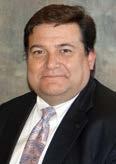

• FASTnet Board of Directors
• Mathiston resident






Nominating committee reports were posted March 14 at both 4-County o ces and online. The deadline for additional nominations for directors, by petition of at least 50 consumer-members, was April 5, no later than noon. At press time, no petitions for nomination from membership were received.
Ballot/proxies will be mailed by May 7 to all 4-County members.
The deadline for returning ballot/proxies is May 31 by noon, six days prior to the annual membership meeting June 6.
Members of the nominating committee present for the March 14 meeting included: Paul Crowley, Benny Graves, Charles McMinn, Pete O’Shea, Jr., Belk Weems, Gary L. Holtman, Frank Howell, John Partridge, Brian D. Power, Sammie L. Williams, James Gillespie, Henri Sue Kennard, and Odie L. Shaw.
• Attended Wood Junior College
• Blue Lodge Mason/Shriner
• Co-owner and manager, Gilliland’s Piggly Wiggly
• President, Gilliland’s of Mathiston Inc.
• Owner/manager, Gilliland Outdoors LLC
• Member, Mathiston First Baptist Church
• Wife, Sandy, two daughters, one son, three grandchildren
• FASTnet Board of Directors
• Clay County resident
• Executive vice president, Bank of Commerce for the Golden Triangle
• Graduate, Mississippi State University with a bachelor’s degree in physics and chemistry and a master’s degree in physics
• GTR Link Executive Board member
• East Mississippi Community College Foundation Board member
• North Mississippi Medical Center-West Point Board member
• Member, West Point Rotary Club
• Member, Cornerstone Church of West Point
• Wife, Melanie
• FASTnet Board of Directors
• Starkville resident
• Businessman/Poultry Farmer
• Graduate, Mississippi State University with a bachelor’s degree in agriculture dairy production
• Oktibbeha County Farm Bureau Board member
• Oktibbeha County Co-op Board member
• Sessums Water Association Board member
• Member, Emmanuel Baptist Church
• Wife, Haley, two daughters, three sons, three grandchildren






Four new employees have recently joined the 4-County team.
Zach Boykin of Louisville has joined the 4-County Electric Power Association team as an electrical engineer.
He comes to 4-County after serving as an electrical and instrumentation engineer for Hargrove, a construction and project management company.
A graduate of Mississippi State University’s Engineer Program, Zach enjoys playing games, hunting, and fishing. He attends Macon Calvary Baptist Church.
Cole Bright of Eupora has joined the 4-County team as a Substation Maintenance technician, based at the Corporate Center.
Prior to 4-County, Cole served as an electric and mechanical maintenance Technician at Yokohama in West Point.
He is a graduate of East Mississippi Community College’s Electrical Technology Program.


Cole attends Maben First Baptist Church. In his spare time, he enjoys hunting, fishing, and riding horses.
Jenna O’Neil of Columbus has joined the co-op team as a member service representative. Prior to 4-County she worked one year as a Member Service Representative for Baptist Memorial Hospital – Golden Triangle. She attended East Mississippi Community College. She and her husband, Zachary, enjoy spending time with family and going to the beach. They have three dogs: Spice, Izzy, and Mazee.
Michael Evans of Aberdeen has joined 4-County as a warehouse technician. Prior to 4-County he worked 18 years as a manager for O’Reilly Auto Parts. He attended Itawamba Community College. His hobbies include cars and hunting. He and his wife, Ashton, have one son, Jace, 9.
Welcome to the 4-County team!
Interested in a speaker or electrical safety/education display for your club or organization? The 4-County/FASTnet Speakers Bureau and Community Service Program may be right for you. The co-op has speakers available for a variety of topics and demonstrations, including electrical safety, electrical e ciency, fiber internet education, and hot line demonstrations. Call us at 1-800-431-1544 for more information. Ask for the marketing department.
Zach Boykin Cole Bright Jenna O’Neil Michael Evans


known where he fits.
“I get to fix stu ,” the 4-County Electric Power Association maintenance crew leader said of his co-op work. “I love puzzles. And that plays right into what I do each day. You just have to sit back and think – using your knowledge and the process of elimination – what the best way is to approach the task at hand. It’s usually a good puzzle. And I like solving the puzzle.”
Prior to 4-County, Richie attended Mississippi State University. He also earned a certificate in industrial electricity from East Mississippi Community College.
Richie’s 4-County work began in September 1989. His career began on Jody Thompson’s rights of way crew. “We worked hard, but we had a good time, too. I learned a lot. If you can work on that crew, you can work anywhere,” he said. Richie also worked on J.B. Gri th’s Corporate Center Construction Crew. He later made his way to the Starkville Customer Service Center, where he worked on Bobby Macon’s crew and became a Journeyman Lineman.
Then, following a brief stint as a safety instructor at the Electric Cooperatives of Mississippi, Richie returned to 4-County where he worked at the co-op’s West Point o ce. Now, he is based at 4-County’s


Starkville o ce where he serves as a maintenance crew leader.
Through the years, Richie said, he has seen a lot of positive changes at the co-op. One of the biggest, however, is a continual focus on equipment. “We’re always upgrading our tools to match the latest technology. It helps us be safer and more e cient,” he added.
Richie lives in Starkville with his wife, Kim. They have five children. And the couple also has seven grandchildren (all ages 6 and under). “It can get a little busy when we’re all together. But, it’s a lot of fun.”
He and Kim attend the Midway Church of Christ in Maben.
His hobbies include working out at the gym “pretty much every day” and riding with Kim on his Honda Goldwing “when the weather permits.”
What does he like best about his hobbies? “I want to stay mobile as I get older. Working out, I believe, will help me stay independent down the road,” he said. “And there is a feeling of power when riding the motorcycle. We love it.”
4-County has been a home away from home for Richie, he explained. “It’s provided for me and my family. I’m blessed,” the veteran co-op employee said. “Everyone here, at the end of the day, is family. I’ve been here for over half of my life. Everyone does their job well and it all works because of that.”

CARTHAGE: 601-267-5671 | PHILADELPHIA: 601-656-2601 | RANKIN: 601-829-1201 | SEBASTOPOL: 601-625-7422
1. Raise your thermostat. The smaller the difference between the indoor and outdoor temp, the more you’ll save.
2. Install window coverings like blinds or light-blocking curtains to prevent indoor heat gain during the day.
When summer temperatures rise, so do our energy bills. Here are a few ways you can reduce energy use and grow your summer savings.
3. Seal leaks with caulk and weatherstripping around windows and exterior doors. Air leaks force your air conditioner to work harder and run longer than necessary.
4. Run ceiling fans for additional cooling but turn them off when you leave the room.
5. Lower your water heater thermostat to 120 degrees to reduce standby heat loss.

Over 300 people attended the 87th Annual Meeting of the Membership of Central Electric Power Association March 19 at the coliseum in Carthage.
The crowd was entertained by One Way Quartet, a southern gospel quartet based out of Attala County. Members enjoyed the old convention-style singing.
General Manager Brian Long opened the meeting followed by the invocation given by Phillip Crosby, a member of the board of directors. Mayor Laurie Henderson of Carthage welcomed the crowd and complimented Manager Long and the board of directors for the wonderful job they do for the community.
Amy Tate, Tennessee Valley Authority (TVA) Southwest Region Executive Leader, provided TVA updates to the members. TVA values their partnership with Central Electric Power Association and the hard work that has been accomplished through the years. Lydia Walters, Electric Cooperatives of MS (ECM) Vice President of Communications, was a guest at the meeting.
Manager Long reported that by the end of 2023, the association had 38,637 members in central Mississippi and 4,363 miles of underground and overhead distribution and transmission lines. Long also praised his sta for working hard, being safe, and keeping the lights on.
To conclude the meeting, a ra e took place. Dozens of prizes, including a smoker, were given to away to lucky members.


The special prize winners were
$1,500 ELECTRICITY CREDIT
Angela Irby Scott County
$500 ELECTRICITY CREDIT
Steve and Yvonne Nowell Neshoba County
Lamar Parker Neshoba County
Pat Barnes, Jr. Scott County
The elected board of directors are Hanna Watson, Neshoba County; David Boyd, Rankin County; and Pettey Leach, Scott County.



 A crowd of more than 300 people attended the 2024 ANNUAL MEET ING
A crowd of more than 300 people attended the 2024 ANNUAL MEET ING
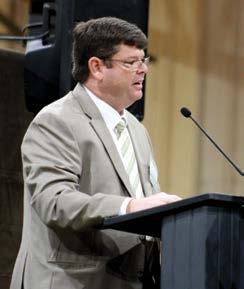



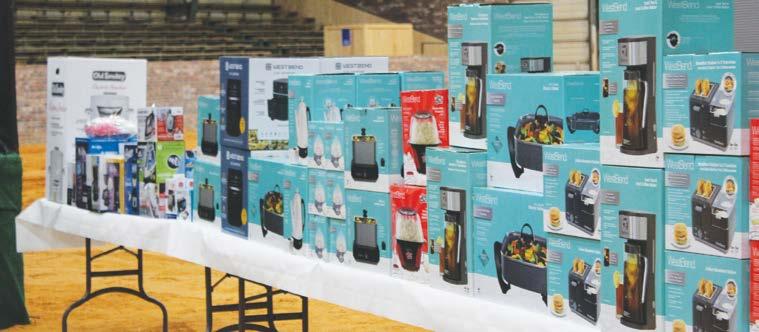 Mayor Laurie Henderson welcomed the crowd to Carthage while complimenting Central Electric on community involvement.
Central Electric provided door prizes for members in attendance.
Brian Long, general manager, delivers the annual report and praises Central Electric staff on a job well done.
Chance Sistrunk, electrical engineer, shares energy efficiency information with members.
Mayor Laurie Henderson welcomed the crowd to Carthage while complimenting Central Electric on community involvement.
Central Electric provided door prizes for members in attendance.
Brian Long, general manager, delivers the annual report and praises Central Electric staff on a job well done.
Chance Sistrunk, electrical engineer, shares energy efficiency information with members.
Enroll today, and instead of receiving a paper bill, we’ll notify you by email when your bill is available to view online.
Receive monthly bill notifications via email; view, analyze, and pay your bill in seconds; and easily access past bill history.

Chuck Pigg, TVA lineman, had the opportunity to show the 4th grade class at Leake Academy in Madden, MS what he does at TVA. e kids viewed one of the helicopters that TVA uses on their transmission projects and asked questions to pilot Ryan Madigan and lineman Stacey Sockwell.

















I often hear claims you’ll never pay an electric bill again if you go solar. Is that true?
The concept of free energy from the sun is appealing, but solar power isn’t free. There are costs associated with capturing that energy for use in your home.
Installing a residential solar system doesn’t equate to $0 energy bills. Prices for the solar system and installation vary, but adding solar typically comes with a five-figure price tag. Solar systems only provide power when the sun is shining. You still rely on your electric utility for power at night and when the skies are cloudy. Most electric utility rate structures include a set monthly service fee. Unless you plan to disconnect from local electric service completely, you will still have a monthly electric bill.
If you are considering solar on your home, I suggest taking these three steps:
1
Make sure your home is as energy e cient as possible. It wouldn’t make sense to put a new motor on a boat with holes in it, so why would you put a solar system on an energywasting home? Invest in reducing wasted energy before investing in creating new energy. The e ciency updates I recommend before installing solar include insulating and air sealing your home and upgrading to e cient appliances — especially the heating, ventilation, and air conditioning system.
If your HVAC system is older than 10 years or malfunctioning, make sure replacing it is in the budget. Remember, energy e ciency upgrades might have a better return on investment than installing solar.
A more e cient home means a smaller — and lower-cost — solar energy system. Solar systems are typically designed to produce the amount of energy a home uses in a year, so if you complete energy e ciency improvements before installing a solar system, make sure the solar contractor accounts for those energy savings.
2


The ability to generate your own renewable energy at home is an amazing thing. However, there are truths and steps members need to know before utilizing this resource.
Check with your electric utility about the requirements to install solar and how it will impact your bill. If you decide to install solar panels, working with your utility will be essential, as you will need to take important steps, such as signing an interconnection agreement to ensure the system is properly connected to the electric grid.

3
Get at least three quotes to compare each contractor’s recommended system design, equipment and cost. It’s a significant investment, so you want to know your options.
There are several ways to pay for a solar system and installation. It can be bought outright with cash or financed by a loan. This allows you to own the system immediately or at the end of the loan term.
There is also the option to install a solar system through a lease or power purchase agreement. In this structure, a third party — usually the solar installer — owns the system. They install the system on your property and then sell you the energy produced at a predetermined rate. They are responsible for maintaining the system and own it at the end of the agreement term.
Loans, leases and power purchase agreements can impact the sale of a home. Although a solar system may increase the value of your home, some buyers — or their lenders — are not interested in taking on leases or power purchase agreements.
Miranda






Summer’s almost here, which means balmy and hot weather, pool parties, barbecues, and vacations. If you are planning on hosting an outdoor party, working on outdoor projects, or participating in other outdoor activities, following safety measures will help you keep your family and home away from harm.
All outdoor electrical receptacles, such as boxes and outlets, should be kept covered and dry, even when in use. Use GFCIs to help protect against electric shock. Keep electrical appliances and equipment at least 6 feet away from water. It goes without saying that water and electricity don't mix, and the results could prove fatal.
Are extension cords safe for permanent use? Extension cords that are not listed, labeled, or rated for permanent or long term use are temporary wiring devices. If you need to permanently connect an electrical device, you should use approved wires and/or cable assemblies installed in an approved manner. Any extension cord that is listed and labeled UL should be safe if it’s used in appropriate locations and is not damaged.
by Qua’Shara MonixMothers are selfless, loving humans who must sacrifice many of their wants and needs for the wants and needs of their children. You know that celebrating mothers is an ancient tradition and not a Hallmark invention, right? Mothers work hard to make sure their child is equipped with the knowledge, skills, and abilities to make it in this world. A mom loves you first, then forever. We work harder than the Nike brand and their logo, JUST DO IT. What if we could brand those famous words into our children or anyone with a dream?


Other extension cord safety reminders:
• Don’t staple them in place
• Don’t use a cord that is rated for less amperage/wattage than you are using
• Don’t try to use a two wire/two prong cord for a three-prong device
• Don’t octopus the cord (adding a multitap adapter at the end of the cord)
• Avoid using extension cords for any high draw devices, such as refrigerators, toaster ovens, irons, or hair dryers
• Don’t leave exterior cords plugged in
• Never use an extension cord when still coiled up. Coiled up cords cannot dissipate heat which can lead to a fire
• It only counts as personal growth if you don’t want to do it. JUST DO IT
• E orts and courage are not enough without purpose and direction. JUST DO IT
• Practice is the price you pay today to be better tomorrow. JUST DO IT
• Don’t let small minds convince you that your dreams are too big. JUST DO IT
• It always seems impossible until it’s done. JUST DO IT
• The secret of getting ahead is getting started. JUST DO IT
• If you want to increase your success rate, double your failure rate. JUST DO IT
• You only live once, but if you do it right, once is enough. JUST DO IT
• You can’t change what’s going on around you until you start changing what’s going on inside of you. JUST DO IT
• Live as if you were to die tomorrow. Learn as if you were to live forever. JUST DO IT
Mothers emphasize hard work and encourage personal sacrifices daily, but unlike Nike, life doesn’t come with a manual...it comes with a mom!




We depend on reliable electricity more than ever before, which is why even the briefest service interruption can be incredibly frustrating. It’s no wonder many homeowners are taking a closer look at the latest battery-powered systems as backups during an outage.
Battery technology has advanced significantly in recent years, with batteries able to hold more electricity even as they shrink in size and cost. The same innovations that boosted the performance of electric vehicles (EVs) are being engineered into today’s battery-powered backup systems.
As their name implies, battery backup systems like Tesla’s Powerwall are essentially high-capacity batteries that store a set amount of electricity, which you can then use to power your home in the event of an outage. Some are constantly charged by the power grid, while others rely on solar panels for recharging.
Traditional standby generators use small internal combustion engines fueled by natural gas, propane or diesel. They can be connected to your home’s electrical panel and kick on automatically whenever the flow of electricity stops. Assuming you keep them refueled, most can operate for days at a time. However, some standby generators can be noisy, and nearly all produce smelly exhaust containing deadly carbon monoxide gas, so they can’t be operated indoors. Large standby generators are typically installed outdoors on a concrete pad, which may detract from your home’s curb appeal.
Most home battery backups are smaller than comparable generators. Because they don’t use combustion to generate electricity, there’s no danger of carbon monoxide exposure. That makes them safer and more environmentally-friendly than generators. Most can be installed in a small space indoors. Battery backups are also significantly quieter.
When a power outage occurs, battery backups start instantaneously, unlike generators that may take a few moments to spool up and reach operating speed. Battery backups also don’t need regular maintenance like oil changes or spark plug replacement, and there’s no need to store fuel.
Of course, battery-powered generators do present some disadvantages. The amount of power they deliver is limited by the capacity of their batteries. When they’re out of electricity, they may need hours of recharging before being used again, so they’re not as well-suited for lengthy outages. Energy-hungry appliances such as
air conditioners and water heaters may drain the batteries’ capacity more quickly, so you may have to disconnect them during an outage. Fortunately, some battery backups are modular, allowing you to add capacity as needed. If you only need a few devices powered during an outage, consider a portable battery-powered system. These small, quiet backups can be used indoors to power smaller appliances, like your laptop, TV or microwave.
Generally, batteries require long charging times, so if an initial outage is quickly followed by another, they may not be able to respond. There are fast-charging systems on the market, but they carry substantially higher price tags. In fact, the upfront cost of a battery backup is more than a standby generator — in some cases, twice as much for comparable performance.
Like the one in your mobile phone, batteries in these systems can degrade over time. In five or 10 years, they may need to be swapped out with new batteries, adding to the overall cost. Being able to recharge battery backups with solar panels appeals to many homeowners, but the performance will depend upon the amount and angle of sunlight falling upon your roof.
So, is a battery-powered backup system right for your home?
The answer is di erent for every homeowner, but whether you’re considering a battery system or a traditional standby generator, start by calculating the amount of power you need to keep your home’s systems and conveniences operating e ciently. Once you know that, you can determine which models are up to the task and calculate how long the device you’re considering can power your home. (If you have a family member whose health depends upon devices such as a CPAP machine or supplemental oxygen, be sure to factor that into your decision.)
Finally, whether you choose a battery backup or a traditional standby generator, make sure it’s designed to protect your home and all your electronics from power surges and other issues that may damage your TVs, computers, and other sensitive electronics. That way, you won’t have to worry about remaining without them long after an outage has ended.
Scott Flood has worked with electric cooperatives to build knowledge of energy-related issues among directors, sta , and members.
1. Raise your thermostat. The smaller the difference between the indoor and outdoor temp, the more you’ll save.
2. Install window coverings like blinds or light-blocking curtains to prevent indoor heat gain during the day.
Source: Dept. of Energy
When summer temperatures rise, so do our energy bills. Here are a few ways you can reduce energy use and grow your summer savings.
3. Seal leaks with caulk and weatherstripping around windows and exterior doors. Air leaks force your air conditioner to work harder and run longer than necessary.
4. Run ceiling fans for additional cooling but turn them off when you leave the room.
5. Lower your water heater thermostat to 120 degrees to reduce standby heat loss.














As a local co-op owned by those we serve, we have a responsibility to educate and inform our members about things that can impact your electric bills. In the past several years, we have seen more companies selling solar panels to our members. While there are reputable companies out there, others exaggerate claims about the savings you can see with solar. If you are considering solar panels, we urge you to contact our energy experts before you buy. As a locally owned not-for-profit company, we can help you make informed decisions about what is best for your family.
by Miranda BoutelleThe concept of free energy from the sun is appealing, but solar power isn’t free. There are costs associated with capturing that energy for use in your home.
Installing a residential solar system doesn’t equate to $0 energy bills. Prices for the solar system and installation vary, but adding solar typically comes with a five-figure price tag. Solar systems only provide power when the sun is shining. You still rely on your electric utility for power at night and when the skies are cloudy. Most electric utility rate structures include a set monthly service fee. Unless you plan to disconnect from local electric service completely, you will still have a monthly electric bill.
If you are considering solar on your home, I suggest taking these three steps:
1
Make sure your home is as energy e cient as possible. It wouldn’t make sense to put a new motor on a boat with holes in it, so why would you put a solar system on an energywasting home? Invest in reducing wasted energy before investing in creating new energy. The e ciency updates I recommend before installing solar include insulating and air sealing your home and upgrading to e cient appliances — especially the heating, ventilation, and air conditioning system.
If your HVAC system is older than 10 years or malfunctioning, make sure replacing it is in the budget. Remember, energy e ciency upgrades might have a better return on investment than installing solar.
A more e cient home means a smaller — and lower-cost — solar energy system. Solar systems are typically designed to produce the amount of energy a home uses in a year, so if you complete energy e ciency improvements before installing a solar system, make sure the solar contractor accounts for those energy savings.
2

Check with your electric utility about the requirements to install solar and how it will impact your bill. If you decide to install solar panels, working with your utility will be essential, as you will need to take important steps, such as signing an interconnection agreement to ensure the system is properly connected to the electric grid.
3

Get at least three quotes to compare each contractor’s recommended system design, equipment and cost. It’s a significant investment, so you want to know your options.
There are several ways to pay for a solar system and installation. It can be bought outright with cash or financed by a loan. This allows you to own the system immediately or at the end of the loan term.
There is also the option to install a solar system through a lease or power purchase agreement. In this structure, a third party — usually the solar installer — owns the system. They install the system on your property and then sell you the energy produced at a predetermined rate. They are responsible for maintaining the system and own it at the end of the agreement term.
Loans, leases and power purchase agreements can impact the sale of a home. Although a solar system may increase the value of your home, some buyers — or their lenders — are not interested in taking on leases or power purchase agreements.
Miranda Boutelle is the chief operating o cer at E ciency Services Group in Oregon.
Coast Electric wants you to reduce your energy use and see savings on your energy costs. Each month, you will have an opportunity to register to win a prize that will help you reduce the energy consumption in your home. Visit www. coastelectric.coop or scan the QR code to enter. It only takes a few seconds, and you could win a prize that helps you save!
Congratulations to our March Reduce Your Use winner, Claudette Luther.




To contact Coast Electric:









Coast Electric’s business o ces will be closed Monday, May 27, for the Memorial Day holiday. We hope everyone takes time over the holiday weekend to remember those who made the ultimate sacrifice for our country. Dispatchers will be on duty and crews will be on call throughout the holiday weekend.
You can report outages by:
• Texting “Outage” to 352667 if you have a mobile number associated with your account.
• Using the CE on the Go mobile app.


• Reporting it online: https://outages.coastelectric.coop/
• We CANNOT take outage reports on our social media accounts. Trying to report your outage on social media does not put your outage into our system or report it to dispatchers or crews.
You can pay a bill by:


• Texting “Pay” to 352667 if you have a mobile number associated with your account.
• Using the CE on the Go mobile app.

• Visiting a kiosk located at each of our o ces.
• Calling 877-769-2372 to use our automated payment system.
To contact CoastConnect:

For all after-hours inquiries, CoastConnect subscribers can chat with tech support on www.CoastConnect.com or call 877-969-3884 and speak to our 24/7 tech support team.















• Use GFCI outlets in rooms with water sources.
• Test smoke and carbon monoxide alarms every month.
• Check electrical cords for damage before use.
• Call 811 before you dig.
• Look for overhead lines before you use ladders outdoors or before your kids fly kites or climb trees.
May is Electrical Safety Month! These safety do’s and don’ts will help keep your home safe from electrical hazards.

• Overload outlets with too many devices.
• Disable smoke and carbon monoxide alarms.
• Use extension cords as permanent solutions.
• Climb on or touch green electrical boxes.

• Use power tools with an extension cord that exceeds 100 feet in length. computers, thermostats, streaming devices and more.
$5 A MONTH PLUS TAX
CoastConnect subscribers can take advantage of add-on features to enhance your monthly service. These options will keep your network and devices safe and secure.
PARENTAL CONTROLS
Restrict searches, set time limits for apps and devices, block and restrict access to websites, monitor where time is spent online and more.
$5 A MONTH PLUS TAX
Coast Electric’s service territory in April. Coast Electric crews were able to restore service to more than 19,000
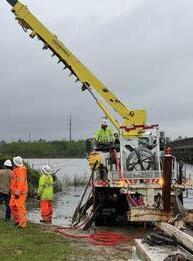

Spring storms caused heavy damage to some areas of Coast Electric’s service territory in April. Coast Electric crews were able to restore service to more than 19,000 members quickly, with additional help from contractor crews. Tornadoes were detected in Hancock, Harrison and Pearl River counties, with areas of Hancock and Pearl River counties receiving the heaviest damage. Heavy winds uprooted trees which damaged power lines and broke over 40 poles. Thanks go to the co-op and contractor employees who helped with restoration e orts, and to members for being patient while they worked.
members quickly, with additional help from contractor crews. Tornadoes were detected in Hancock, Harrison and Pearl River counties, with areas of Hancock and Pearl River counties receiving the heaviest damage. Heavy winds uprooted trees which damaged power lines and broke over 40 poles. Thanks go to the co-op and contractor employees who helped with restoration efforts, and to members for being patient while they worked.

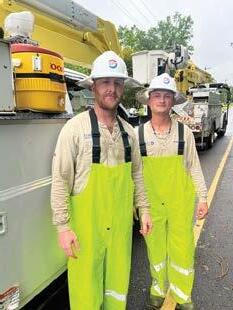



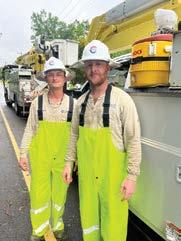









Located on West Gay Road in D’Iberville, near the hustle and bustle of The Promenade, filled with majestic oak trees, cypress trees, a nine-acre pond and a thriving ecosystem.
Located on West Gay Road in D’Iberville, near the hustle and bustle of The Promenade, is a quiet escape filled with majestic oak trees, cypress trees, a nine-acre pond and a thriving ecosystem. Coast Electric employees, through a partnership with the Land Trust for the Mississippi Coastal Plain, created and maintain a pollinator garden and Monarch Waystation on the 44-acre property. This spring, caterpillars are thriving in the garden, enjoying the milkweed and other native plants. Besides maintaining the garden, employees spent time building a bridge that allows access to a pond on the property. For more information about planning a visit to the property, visit www.coastelectric.coop and select “My Community” from the main menu and then “Environmental Programs.”
employees, through a partnership with the Land Trust for the Mississippi Coastal maintain a pollinator garden and Monarch Waystation on the 44-acre property. thriving in the garden, enjoying the milkweed and other native plants. Besides maintaining employees spent time building a bridge that allows access to a pond on the property. about planning a visit to the property, visit www.coastelectric.coop and select “My main menu and then “Environmental Programs.”

Located on West Gay Road in D’Iberville, near the hustle and bustle of The Promenade, is a quiet escape filled with majestic oak trees, cypress trees, a nine-acre pond and a thriving ecosystem. Coast Electric employees, through a partnership with the Land Trust for the Mississippi Coastal Plain, created and maintain a pollinator garden and Monarch Waystation on the 44-acre property. This spring, caterpillars are thriving in the garden, enjoying the milkweed and other native plants. Besides maintaining the garden, employees spent time building a bridge that allows access to a pond on the property. For more information about planning a visit to the property, visit www.coastelectric.coop and select “My Community” from the main menu and then “Environmental Programs.”



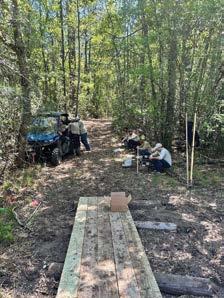



Located on West Gay Road in D’Iberville, near the hustle and bustle of The Promenade, is a quiet escape filled with majestic oak trees, cypress trees, a nine-acre pond and a thriving ecosystem. Coast Electric employees, through a partnership with the Land Trust for the Mississippi Coastal Plain, created and maintain a pollinator garden and Monarch Waystation on the 44-acre property. This spring, caterpillars are thriving in the garden, enjoying the milkweed and other native plants. Besides maintaining the garden, employees spent time building a bridge that allows access to a pond on the property. For more information about planning a visit to the property, visit www.coastelectric.coop and select “My Community” from the main menu and then “Environmental Programs.”






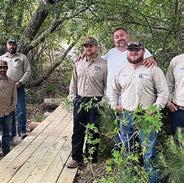
















I often hear claims you’ll never pay an electric bill again if you go solar. Is that true?
Q A 2
The concept of free energy from the sun is appealing, but solar power isn’t free. There are costs associated with capturing that energy for use in your home.
Installing a residential solar system doesn’t equate to $0 energy bills. Prices for the solar system and installation vary, but adding solar typically comes with a five-figure price tag. Solar systems only provide power when the sun is shining. You still rely on your electric utility for power at night and when the skies are cloudy. Most electric utility rate structures include a set monthly service fee. Unless you plan to disconnect from local electric service completely, you will still have a monthly electric bill.
If you are considering solar on your home, I suggest taking these three steps:
1
Make sure your home is as energy e cient as possible. It wouldn’t make sense to put a new motor on a boat with holes in it, so why would you put a solar system on an energy-wasting home? Invest in reducing wasted energy before investing in creating new energy. The e ciency updates I recommend before installing solar include insulating and air sealing your home and upgrading to e cient appliances — especially the heating, ventilation, and air conditioning system.
If your HVAC system is older than 10 years or malfunctioning, make sure replacing it is in the budget. Remember, energy e ciency upgrades might have a better return on investment than installing solar.
A more e cient home means a smaller — and lower-cost — solar energy system. Solar systems are typically designed to produce the amount of energy a home uses in a year, so if you complete energy e ciency improvements before installing a solar system, make sure the solar contractor accounts for those energy savings.





The ability to generate your own renewable energy at home is an amazing thing. However, there are truths and steps members need to know before utilizing this resource.
Check with your electric utility about the requirements to install solar and how it will impact your bill. If you decide to install solar panels, working with your utility will be essential, as you will need to take important steps, such as signing an interconnection agreement to ensure the system is properly connected to the electric grid.

Get at least three quotes to compare each contractor’s recommended system design, equipment and cost. It’s a significant investment, so you want to know your options.
There are several ways to pay for a solar system and installation. It can be bought outright with cash or financed by a loan. This allows you to own the system immediately or at the end of the loan term.
There is also the option to install a solar system through a lease or power purchase agreement. In this structure, a third party — usually the solar installer — owns the system. They install the system on your property and then sell you the energy produced at a predetermined rate. They are responsible for maintaining the system and own it at the end of the agreement term.
Loans, leases and power purchase agreements can impact the sale of a home. Although a solar system may increase the value of your home, some buyers — or their lenders — are not interested in taking on leases or power purchase agreements.
Miranda Boutelle is the chief operating o cer at E ciency Services Group in Oregon.







We depend on reliable electricity more than ever before, which is why even the briefest service interruption can be incredibly frustrating. It’s no wonder many homeowners are taking a closer look at the latest battery-powered systems as backups during an outage.
Battery technology has advanced significantly in recent years, with batteries able to hold more electricity even as they shrink in size and cost. The same innovations that boosted the performance of electric vehicles (EVs) are being engineered into today’s battery-powered backup systems.
As their name implies, battery backup systems like Tesla’s Powerwall are essentially high-capacity batteries that store a set amount of electricity, which you can then use to power your home in the event of an outage. Some are constantly charged by the power grid, while others rely on solar panels for recharging.
whenever the flow of electricity stops. Assuming you keep them refueled, most can operate for days at a time. However, some standby generators can be noisy, and nearly all produce smelly exhaust containing deadly carbon monoxide gas, so they can’t be operated indoors. Large standby generators are typically installed outdoors on a concrete pad, which may detract from your home’s curb appeal.
Whether you choose a battery backup or a traditional standby generator, make sure it’s designed to protect your home and all your electronics from power surges and other issues that may damage your TVs, computers, and other sensitive electronics.
Traditional standby generators use small internal combustion engines fueled by natural gas, propane or diesel. They can be connected to your home’s electrical panel and kick on automatically
Most home battery backups are smaller than comparable generators. Because they don’t use combustion to generate electricity, there’s no danger of carbon monoxide exposure. That makes them safer and more environmentally-friendly than generators. Most can be installed in a small space indoors. Battery backups are also significantly quieter.
When a power outage occurs, battery backups start instantaneously, unlike generators that may take a few moments to spool up and reach operating speed. Battery backups also don’t need regular maintenance like oil changes or spark plug replacement, and there’s no need to store fuel.



Of course, battery-powered generators do present some disadvantages. The amount of power they deliver is limited by the capacity of their batteries. When they’re out of electricity, they may need hours of recharging before being used again, so they’re not as well-suited for lengthy outages. Energy-hungry appliances such as air conditioners and water heaters may drain the batteries’ capacity more quickly, so you may have to disconnect them during an outage. Fortunately, some battery backups are modular, allowing you to add capacity as needed. If you only need a few devices powered during an outage, consider a portable battery-powered system. These small, quiet backups can be used indoors to power smaller appliances, like your laptop, TV or microwave.
Generally, batteries require long charging times, so if an initial outage is quickly followed by another, they may not be able to respond. There are fast-charging systems on the market, but they carry substantially higher price tags. In fact, the upfront cost of a battery backup is more than a standby generator — in some cases, twice as much for comparable performance.
Like the one in your mobile phone, batteries in these systems can degrade over time. In five or 10 years, they may need to be swapped out with new batteries, adding to the overall cost. Being able to recharge battery backups with solar panels appeals to many homeowners, but the performance will depend upon the amount and angle of sunlight falling upon your roof.
So, is a battery-powered backup system right for your home? The answer is di erent for every homeowner, but whether you’re considering a battery system or a traditional standby generator, start by calculating the amount of power you need to keep your home’s systems and conveniences operating e ciently. Once you know that, you can determine which models are up to the task and calculate how long the device you’re considering can power your home. (If you have a family member whose health depends upon devices such as a CPAP machine or supplemental oxygen, be sure to factor that into your decision.)
Finally, whether you choose a battery backup or a traditional standby generator, make sure it’s designed to protect your home and all your electronics from power surges, and other issues that may damage your TVs, computers, and other sensitive electronics. That way, you won’t have to worry about remaining without them long after an outage has ended.


 Scott Flood has worked with electric cooperatives to build knowledge of energy-related issues among directors, sta , and members.
As their name implies, battery backup systems like Tesla’s Powerwall are essentially high-capacity batteries that store a set amount of electricity, which you can then use to power your home in the event of an outage. Photo Courtesy of Tesla, Inc.
Scott Flood has worked with electric cooperatives to build knowledge of energy-related issues among directors, sta , and members.
As their name implies, battery backup systems like Tesla’s Powerwall are essentially high-capacity batteries that store a set amount of electricity, which you can then use to power your home in the event of an outage. Photo Courtesy of Tesla, Inc.
1. Raise your thermostat. The smaller the difference between the indoor and outdoor temp, the more you’ll save.
2. Install window coverings like blinds or light-blocking curtains to prevent indoor heat gain during the day.
Source: Dept. of Energy
When summer temperatures rise, so do our energy bills. Here are a few ways you can reduce energy use and grow your summer savings.
3. Seal leaks with caulk and weatherstripping around windows and exterior doors. Air leaks force your air conditioner to work harder and run longer than necessary.
4. Run ceiling fans for additional cooling but turn them off when you leave the room.
5. Lower your water heater thermostat to 120 degrees to reduce standby heat loss.







dixieepa.com




dixieepa.com | defastlink.net | 601-425-2535 @DixieElectricMS

In today’s fast-paced world, technology continues to revolutionize the way we live. One significant advancement is the rise of smart home devices, which o er unparalleled convenience and energy e ciency. Co ee pots that start themselves in the morning just before you wake up and refrigerators that send text reminders to you to pick up milk on the way home from the o ce may sound like things out of “The Jetsons.” But the reality is that they are popular features on today’s appliances. The future is already here – thanks to cutting-edge smart home technology and the availability of high-speed internet. Pairing your smart home devices with fiber internet, such as DE Fastlink, can also lead to substantial savings on your power bills while enhancing your quality of life. The possibilities can be overwhelming, so I thought I would give you my advice on where to start.
DE Fastlink internet empowers your smart home devices to communicate seamlessly. With its high-speed connectivity, you can control various aspects of your home remotely, optimizing your energy use even when you’re away. You can also use smart home assistants, such as Amazon Alexa, to make hands-free calls, answer emails and texts, set alarms and reminders, search the web, schedule meetings and events, play music on demand, and control your connected smart home devices. Although they aren’t necessary to use your smart home devices, smart home assistants o er convenience, increased productivity and additional accessibility.
Speaking of smart home devices, let’s talk about the one that o ers the most bang for your buck. Smart thermostats can cut heating and cooling energy consumption by an average of 20 percent annually. By integrating them with your DE Fastlink internet, you gain the ability to adjust temperatures based on your schedule and preferences from anywhere. Many smart thermostats provide detailed energy use reports and insights that break down your consumption patterns and track how much energy you’re using and when. Once you have this data, you can identify areas of high usage and make adjustments to better fit your habits—and your budget.
Lighting is another area where smart technology shines. By using smart bulbs or switches, you can remotely manage your lighting both inside and outside your home. Forgot to turn o the lights before leaving for work? No problem! Simply tap into your smart home app and switch

We honor those who courageously gave their lives in military service for the United States. Transforming

inside and outside your home. Forgot to turn o the lights before leaving for work? No problem! Simply tap into your smart home app and switch MONDAY, MAY 27




them o , preventing unnecessary energy use. Going on vacation? Schedule your lights to cut on and o remotely, o ering an added layer of security by making your home appear occupied while away.
Safeguarding your property and loved ones by integrating your security system or cameras with fiber internet can o er you peace of mind. High-definition cameras equipped with motion sensors can send real-time alerts to your smartphone, allowing you to monitor your home from anywhere. Whether you’re at work or on vacation, you can check in on your property, allowing the opportunity for swift action in case of any security concerns.
Lastly, emergency SOS systems ensure an added layer of safety for vulnerable loved ones. These systems can be set up to instantly alert emergency services or designated contacts in case of a medical emergency or other urgent situations. With the ultra-fast and reliable connection provided by DE Fastlink, response times are minimized, potentially saving crucial moments during emergencies. Whether it’s an elderly family member living alone or a person with specific medical needs, having this level of connectivity can be life-saving. These emergency systems provide the peace of mind that help is always just a click away.
Even though it may seem daunting, there are many benefits to transforming your home into a Smart Home. Convenience and control, energy e ciency and cost savings, enhanced comfort, improved security and safety, and remote monitoring are just a few. Smart home devices are not only easy to install, but they are also easy to use and are designed to enhance your overall quality of life. In order for these devices to work most e ciently, they need to be paired with fast and reliable fiber internet. If you want more information on smart home devices and how to get started, give us a call.






Our business o ces will be closed Monday, May 27, in observance of Memorial Day. Dixie Electric personnel will be on call throughout the holiday weekend. Call 601-425-2535 to report a power outage.



 by Amanda Mills
by Amanda Mills






Dixie Electric held its third annual Student Art Contest, where 7-12th grade students, who also live within Dixie Electric's service territory, were invited to submit artwork based around the theme of electric cooperatives.
Dixie Electric received 15 art submissions from across the seven counties it serves. The artwork was judged by an electric cooperative graphic artist from Jackson, Miss.
Brylee McLaurin, a seventh-grade student from South Jones High School, was chosen as the winner of the 2024 Student Art Contest. Brylee describes her painting as an acrylic on canvas that took six sessions to complete.
“My inspiration for this painting was from photographs of the Bush Farm across from West Jones High School,” said Brylee. “The landscape, old barn, and cows with the power lines were the inspiration for the rural electric power theme in the competition.”
Brylee began art lessons at Anderson Square in North Laurel when she was seven years old. She fell in love with art quickly and has kept it as a hobby since then. Over the last two years, Brylee has taken private art lessons from Lori Harrison to advance her artistic skills.
"I really enjoy drawing and painting various types of animals, such as horses, cats, dogs, and cows,” said Brylee. “I enjoy learning about the di erent styles of artwork and the use of di erent mediums.”
When Brylee thinks of her favorite artists who inspire her, she keeps her love for art local. “I really admire (the late) Mandy Buchanan from Laurel as well as Mississippi Gulf Coast artist Walter Anderson.”
This isn't the first award Brylee has won for her artwork. “I've won first place in acrylics, first place in watercolor, and first place in oil pastel for di erent artwork at the South Mississippi Fair art competition” said Brylee. “I also received first place in acrylics and oil pastels at Laurel's Day in the Park.”








When she isn’t drawing or painting, Brylee has plenty to keep her busy. Brylee is a member of the junior varsity colorguard team at South Jones, where they just received 3rd place in the Cadet division at the Mississippi Indoor Association Championship. Brylee is also an active swimmer, participating as a member of the South Jones swim team along with the Laurel Swim Association.
“I was so excited and honored that my painting was selected for this award,” said Brylee. “I’m excited to continue to grow and learn as an artist.” Brylee lives in the Pleasant Ridge Community with her parents, Chad and Lacey McLaurin, and attends Pleasant Ridge Baptist Church.
In addition to the judging in our Student Art Contest, Dixie Electric takes to Facebook to allow the community to vote for their favorite art submission, which has been named the Fan-Favorite Award. With over 630 votes, Baylee Powell, an 11th-grade student at West Jones High School, won with her acrylic painting with oil pastel detailing of retired operations manager Pat McCarthy. Baylee also won second place in the judging competition.
Baylee has been drawing and painting as long as she can remember and has been taking art classes since the 7th grade. Although Baylee has had art teachers help to push her with her skills, her true inspiration has been her dad, Dana Powell.
“I’m a fan of Rembrandt’s style as well as Salvador Dali's; however, most of my favorite artists and art styles come from the Renaissance Era,” said Baylee. “I really admire artists from that era, such as Da Vinci, Michelangelo, and Raphael.”
In addition to art, Baylee loves to read and write. She is also involved in the Student Council, Beta Club, and National Art Honors Society and is in the Top 5 of her class. She is also a 2024 Cooperative Youth Leaders participant and was chosen by Mississippi State University to participate in their Humanities Camp this summer.
“I’m so grateful to have been chosen as the Fan Favorite,” said Baylee. “It’s such an honor to read all the encouragement and kind comments that were left on my piece from people I don’t even know!”
Baylee’s artwork will be on display in Dixie Electric’s Petal o ce, and she is the recipient of $100.

 by Amanda Mills
by Amanda Mills



Just about any of our members who have already made the switch from older forms of internet to DE Fastlink’s fiber broadband will tell you that fiber's advanced technology is vastly superior to anything else they've used.
Fiber is simply heads and shoulders above cable, DSL, and satellite internet. How, you may ask? Fiber internet downloads files at near lightspeed, provides voluminous amounts of available bandwidth for handling multiple applications simultaneously, and has more reliable material components that provide pristine streaming TV and movie experiences.
Fiber internet, like the kind delivered by DE Fastlink, can genuinely enhance your quality of life in a myriad of ways, including the following six. So, let’s take a closer look at how fiber internet makes a di erence.
We begin with everyone's top priority—keeping their family healthy. The internet now plays a significant role in delivering healthcare to millions. Telehealth, which allows physicians and other medical professionals to provide initial consultations (and other healthcare) from a patient's home, has expanded massively in recent years.
Telehealth helps doctors and patients assess when more urgent in-person care is needed and when it's not. Prescriptions can get filled faster with telehealth, and consultations over the internet can even assist in properly applying first aid to injuries.
Telehealth consultations can be performed quickly and reliably thanks to fiber's bounty of bandwidth, which lets audio and video data transfer between doctor and patient seamlessly. Many doctors won't make a diagnosis when a poor internet connection causes choppy video calls, but that's not a problem when the patient has fiber!
While remote work isn't for everyone, it can be life-changing for those who need a little more flexibility. Plus, while avoiding the hassles of commutes and tra c delays, remote workers also save money on gasoline. In addition, remote work is appealing to younger generations, making it more enticing for our young families to stay in Mississippi rather than move to larger cities.
While many workers and employers decide to go fully remote, even partial remote work flexibility can be a blessing. However, it takes a particularly robust internet connection to facilitate remote work, especially video conferencing, which isn't always supported by inferior connections like satellite.
Fiber's symmetrical downloads and uploads let workers send and receive large files and transmit data during long meetings and conferences, making a remote sta member genuinely feel part of the team.
Access to higher education is more attainable now than ever, thanks to the multitude of online distance learning opportunities available through colleges and universities around the country.
From undergraduate and graduate degrees to technical certifications, the internet puts education within reach for many who thought it was impossible or beyond their means while helping them achieve the skills necessary to meet their career goals.
Fiber internet's enormous bandwidth facilitates reliable distance learning and even genuine classroom experiences. It allows students and professors to share large files like presentations or lectures in real-time and enables video conferencing to foster learning and growth, including one-on-one student-faculty interactions—all without sweating frequent distortions or outages that frustrate students on older internet technologies.
Fiber internet and its spectacular speeds and enormous bandwidth capacities make it possible to power a genuine smart home—a place brimming with tech and devices to cut energy use and costs and make life better and more e cient.
From smart refrigerators that let you know when it's time to get a new gallon of milk- to smart lighting that cuts o when you leave home - to smart speakers playing music throughout every room, smart home technology can turn your dwelling into the home of your dreams.
Remember that fiber can keep these devices and smart home features running smoothly while still letting you stream TV and movies, upload videos, and enjoy everything else about your internet. Unlike other forms of internet, with fiber, you're not forced to choose which online activity to sacrifice at any given time.
5. Smart home security makes for safer homes and neighborhoods
One smart home feature everyone should take advantage of is improved real-time safety and security delivered by smart lighting, smart cameras, smart doorbells, and related tech. Fiber-powered devices can monitor your home for security threats at all times, whether you're tucked in your own bed upstairs or thousands of miles away on vacation.
Additionally, outdoor smart lighting and doorbell systems help make your neighborhood safer, too, deterring "porch pirates" and other crimes. Fiber has the power to keep these crucial smart home safety and security systems running strong while still allowing you to stay productive and engaged in other online activities simultaneously.
Lastly, fiber's impressive speeds and incredible bandwidth make video calling crystal clear and convenient. Grandparents can easily have face-toface conversations with their grandchildren, and both sides of the call can see faces as well as hear voices.
Video calling is simply a much more intimate way to stay in touch than by phoning or emailing. Fiber enables this improved communication without the distortions and interruptions that plague other types of internet.
The six examples above are just a small sample of the way fiber internet's innovative technology enhances your life. From practical matters like health, work, and security, to broadening your worldview and sharing knowledge and world cultures, fiber can improve your well-being, inspire your mind, and uplift you.
To learn additional ways that DE Fastlink's fiber can make a real di erence in your life, follow our social pages or visit defastlink.net!
Dixie Electric will be implementing a rate change e ective June 1, 2024. This is the second step of a rate study conducted for 2023.
The consumer charge for residential members is increasing from $.86 per day to $.99 per day while the cost per kilowatt-hour remains flat. General use accounts, such as barns, pumps, or shops, will also see an increase in their consumer charge from $1.08 per day to $1.27 per day.
Below is a comparison of the existing and new residential rates with the consumer charge included at di erent levels of kilowatt-hour use. These are estimates because of fluctuations in costs at the wholesale level associated with the generation of electricity.






Want to say goodbye to expensive cable and satellite TV bills and move to money-saving streaming, but don’t know how? Our StreamNow website, powered by DE Fastlink, makes it as easy as 1, 2, 3! You’ll find step-by-step guidance on streaming services, devices, and more.

Scan the QR code to visit gostreamnow.com/defastlink.
Dixie Electric Power Association clears trees, limbs, and underbrush from the area around and below the power lines, called the right-of-way. Right-of-way clearing decreases the number of outages and reduces the risk of someone coming in contact with the power lines. Clearing the right-of-way protects individuals from the hazards of electricity and makes power restoration quicker and safer for both Dixie Electric’s members and personnel.
Glade: Glade, Myrick, Tuckers Crossing, North Jones Old Augusta: New Augusta, Leaf River Sawmill

Candidates seeking election to represent Districts 3, 4, and 6 on the board of directors for Dixie Electric must visit Dixie Electric’s headquarters o ce at 1863 Highway 184, Laurel, Miss., and obtain a Director Qualification Packet during normal business hours between June 1 and July 31. Please contact Mitzi Walley at 601-425-2535 or dixieelectric@dixieepa.com to set up a time. The forms and petitions in the packet must be completed and returned by close of business on Wednesday, July 31, 2024.














How many of us remember dropping into an EMEPA o ce with our parents and grandparents to pay the “light” bill? Whether you do that in person, by mail or online today, paying your monthly bill does a lot more than just keep the lights on.
Electricity keeps us connected to our modern world. Consider all the necessities and conveniences we enjoy in part because of the power lines running to the electric meter outside your home.
Count your televisions, desktop, laptop and tablet computers, printers, your gaming consoles, music and video players, and personal assistant devices. Whether they get used every day or just occasionally, the electricity that keeps them working comes from EMEPA.
Have you looked around your kitchen lately? Between the co ee maker and toaster and the microwave and electric skillet, a lot of us have added several other modern small appliances.
If you’ve got a craft nook or workshop, the power tools and machines you use to cut and shape your projects are either plugged in or recharged from the outlets connecting your household wiring to EMEPA.
We use electricity to run all these devices, keep the lights on, use the stove, heating and air conditioning, and get hot water from the tap. The good news is, even as we rely more on electricity, it’s still a bargain, especially compared to other things we pay for regularly. On average, our members use less than $3.50 per day per person for all these life conveniences.
When it comes to value, electricity is a clear winner, and we’re always looking for ways to work with you to make it even better. That’s why EMEPA promotes energy e ciency, encourages you

















to look for ENERGY STAR® appliances, and promotes technology designed to give members more control over their electricity use.

Energy performance dashboards, smart thermostats and power strips, and appliance settings that shift most water heating, laundry, and dishwashing outside of peak rate periods help reduce the co-op’s overall power demand. They also give you opportunities to control or even trim your monthly utility bills.
That’s good for families, couples and individuals trying to live within their budgets. And it’s going to become even more important as digital devices and internet-connected technologies become more integral to our lives.
The average home now has 17 Wi-Fi connected devices. That number is expected to explode with every new device available. Even our vehicles connect to the home network for updates. Technology and the gateways that keep it working use electricity, so you depend on EMEPA for more than the power that keeps the lights on.

That’s why we’re always working to provide service that’s reliable, a ordable, and resilient to ensure even more value to our members. CEO




EMEPA o ces will be closed Monday, May 13, to allow our team members to attend an employee-wide meeting, and Monday, May 27, in observance of Memorial Day.






Dispatchers and crews will remain on call and ready to respond to any outage or emergency. Account information and outage reporting is available 24/7 on our app or at EMEPA.com.

1. Raise your thermostat. The smaller the difference between the indoor and outdoor temp, the more you’ll save.
2. Install window coverings like blinds or light-blocking curtains to prevent indoor heat gain during the day.

When summer temperatures rise, so do our energy bills. Here are a few ways you can reduce energy use and grow your summer savings.
3. Seal leaks with caulk and weatherstripping around windows and exterior doors. Air leaks force your air conditioner to work harder and run longer than necessary.
4. Run ceiling fans for additional cooling but turn them off when you leave the room.
5. Lower your water heater thermostat to 120 degrees to reduce standby heat loss.
We appreciate our members and the opportunity to serve you as your local electric cooperative! We are celebrating you May 14 – 17, with Member Appreciation Days. Visit your local EMEPA o ce on the dates listed below for giveaways and treats while supplies last.
Tuesday, May 14
• Quitman
Wednesday, May 15 • Louisville
Thursday, May 16 • DeKalb
Friday, May 17 • Meridian
Source: Dept. of Energy


















East Mississippi Electric Power Association employees and supporters came together at Camp Binachi in Lauderdale County in March to raise $35,000 to help fund research and patient support programs for the countless people battling cancer.
The 11th Annual Shoot for A Cure clay-shooting event raised needed funds for Anderson Cancer Center’s Cancer Patient Benevolence Fund and St. Jude’s Children Research Hospital.
“Through Shoot for A Cure, we are able to support research to find a cure for cancer while also directly benefiting cancer patients in our local communities,” said EMEPA Executive Assistant and event coordinator Margaret Brewer.
Thank you to all of EMEPA’s 11th Annual Shoot for A Cure sponsors and participants for your continued support.






































Speed: With lightning-fast download and upload speeds, users experience seamless browsing, streaming and gaming without the frustration of bu ering or lagging.
Reliability: While other providers may su er from frequent outages or slowdowns during peak hours, East MS Connect guarantees a stable connection due to its advanced network.
Fiber optic technology: East MS Connect uses cutting-edge fiber optic technology to deliver unmatched speed and reliability.












There is so much more to the story of your internet connection than just speed. While speed is very important, what happens if you can’t log in to your account to pay your bill and connecting with customer support is di cult? How much does the speed matter if there are frequent outages? Or if the speed isn’t consistent?






Customer support: With a dedicated team of LOCAL support specialists available 24/7, users can rest assured that any issues or concerns will be addressed promptly and e ciently.
Local focus: East MS Connect is deeply rooted in the community, prioritizing local customer service and support. East MS Connect treats each subscriber with personalized care and attention.
A ordability: Despite o ering premium service, East MS Connect remains competitively priced, making high-speed internet accessible to all residents of East Mississippi. There are never gimmicks or price increases.



Among the provider options available locally, East Mississippi Connect stands out as a beacon of excellence, o ering unparalleled service that sets it apart from the competition.
East MS Connect stands head and shoulders above the competition.
A nationwide provider might seem more appealing at first, but they can’t compete with the benefits East MS Connect provides its subscribers. We understand the community we serve on a deep level, and we can provide specific focus to its unique needs. East MS Connect o ers the resources and power of a nationwide company combined with the a ordability and communitymindedness of a local one. There’s truly nothing like it! Sign up today and see the di erence for yourself.



























Magnolia Electric Power (MEP) members gathered in the company’s auditorium on March 21, 2024, at the headquarters in Summit, and three incumbent directors were re-elected to their posts.
During the business meeting, John McCabe, Pat Ard, and Hollis Alford were re-elected to three-year terms on the board of directors. This election was directed by the board attorney, Reggie Jones.
The 2024 Annual Meeting proxies, which were returned to White and Associates LLP, an independent Certified Public Accounting (CPA) firm first, were counted and certified by the firm before being turned over to the MEP Elections and Credential Committee.
The Elections and Credential Committee, comprised of one appointed MEP member for the six districts not up for election, met on Monday, March 18, 2024, and validated the proxies for the Board Elections.
As part of the business meeting, Auditor Mark Biggs informed those in attendance that MEP remains in sound financial condition.

MEP General Manager Darrell Smith gave an Annual Meeting report, too.
Vice-President Dennis Wilson and Assistant Secretary Scott Smith also conducted a portion of the business meeting.
Before the Annual Meeting was dismissed, winners’ names for door prizes were drawn for those in attendance.
The winners in attendance included Allen Bass who won a $500 credit for electricity. Those receiving a $50 credit on their electric bill are Michael Eldred, Jay Evans, Marvin Flatau, Larry Hughes, and James Laird.
Prior to the meeting starting, winners from those who sent in proxies were drawn. The proxy winners, who have been notified by mail, include Sidney Arnold who won a $500 credit for electricity. Those receiving a $50 credit on their electric bill are Linda Atwood, Johnny May, Donald Tobias, Dianne Wade, and Floyd Wilkinson.
MEP is an electric cooperative and holds an Annual Meeting for its members. Members participate by either returning their proxy or attending the meeting.








 MEP employees greet the members at the registration table as they come into the building for the 2024 Annual Meeting.
MEP employees greet the members at the registration table as they come into the building for the 2024 Annual Meeting.





We depend on reliable electricity more than ever before, which is why even the briefest service interruption can be incredibly frustrating. It’s no wonder many homeowners are taking a closer look at the latest battery-powered systems as backups during an outage.
Battery technology has advanced significantly in recent years, with batteries able to hold more electricity even as they shrink in size and cost. The same innovations that boosted the performance of electric vehicles (EVs) are being engineered into today’s battery-powered backup systems.
As their name implies, battery backup systems like Tesla’s Powerwall are essentially high-capacity batteries that store a set amount of electricity, which you can then use to power your home in the event of an outage. Some are constantly charged by the power grid, while others rely on solar panels for recharging.
whenever the flow of electricity stops. Assuming you keep them refueled, most can operate for days at a time. However, some standby generators can be noisy, and nearly all produce smelly exhaust containing deadly carbon monoxide gas, so they can’t be operated indoors. Large standby generators are typically installed outdoors on a concrete pad, which may detract from your home’s curb appeal.
Whether you choose a battery backup or a traditional standby generator, make sure it’s designed to protect your home and all your electronics from power surges and other issues that may damage your TVs, computers, and other sensitive electronics.
Traditional standby generators use small internal combustion engines fueled by natural gas, propane or diesel. They can be connected to your home’s electrical panel and kick on automatically
Most home battery backups are smaller than comparable generators. Because they don’t use combustion to generate electricity, there’s no danger of carbon monoxide exposure. That makes them safer and more environmentally-friendly than generators. Most can be installed in a small space indoors. Battery backups are also significantly quieter.
When a power outage occurs, battery backups start instantaneously, unlike generators that may take a few moments to spool up and reach operating speed. Battery backups also don’t need regular maintenance like oil changes or spark plug replacement, and there’s no need to store fuel.



Of course, battery-powered generators do present some disadvantages. The amount of power they deliver is limited by the capacity of their batteries. When they’re out of electricity, they may need hours of recharging before being used again, so they’re not as well-suited for lengthy outages. Energy-hungry appliances such as air conditioners and water heaters may drain the batteries’ capacity more quickly, so you may have to disconnect them during an outage. Fortunately, some battery backups are modular, allowing you to add capacity as needed. If you only need a few devices powered during an outage, consider a portable battery-powered system. These small, quiet backups can be used indoors to power smaller appliances, like your laptop, TV or microwave.
Generally, batteries require long charging times, so if an initial outage is quickly followed by another, they may not be able to respond. There are fast-charging systems on the market, but they carry substantially higher price tags. In fact, the upfront cost of a battery backup is more than a standby generator — in some cases, twice as much for comparable performance.
Like the one in your mobile phone, batteries in these systems can degrade over time. In five or 10 years, they may need to be swapped out with new batteries, adding to the overall cost. Being able to recharge battery backups with solar panels appeals to many homeowners, but the performance will depend upon the amount and angle of sunlight falling upon your roof.
So, is a battery-powered backup system right for your home? The answer is di erent for every homeowner, but whether you’re considering a battery system or a traditional standby generator, start by calculating the amount of power you need to keep your home’s systems and conveniences operating e ciently. Once you know that, you can determine which models are up to the task and calculate how long the device you’re considering can power your home. (If you have a family member whose health depends upon devices such as a CPAP machine or supplemental oxygen, be sure to factor that into your decision.)
Finally, whether you choose a battery backup or a traditional standby generator, make sure it’s designed to protect your home and all your electronics from power surges and other issues that may damage your TVs, computers, and other sensitive electronics. That way, you won’t have to worry about remaining without them long after an outage has ended.


 Scott Flood has worked with electric cooperatives to build knowledge of energy-related issues among directors, sta , and members.
As their name implies, battery backup systems like Tesla’s Powerwall are essentially high-capacity batteries that store a set amount of electricity, which you can then use to power your home in the event of an outage. Photo Courtesy of Tesla, Inc.
Scott Flood has worked with electric cooperatives to build knowledge of energy-related issues among directors, sta , and members.
As their name implies, battery backup systems like Tesla’s Powerwall are essentially high-capacity batteries that store a set amount of electricity, which you can then use to power your home in the event of an outage. Photo Courtesy of Tesla, Inc.
1. Raise your thermostat. The smaller the difference between the indoor and outdoor temp, the more you’ll save.
2. Install window coverings like blinds or light-blocking curtains to prevent indoor heat gain during the day.
Source: Dept. of Energy
When summer temperatures rise, so do our energy bills. Here are a few ways you can reduce energy use and grow your summer savings.
3. Seal leaks with caulk and weatherstripping around windows and exterior doors. Air leaks force your air conditioner to work harder and run longer than necessary.
4. Run ceiling fans for additional cooling but turn them off when you leave the room.
5. Lower your water heater thermostat to 120 degrees to reduce standby heat loss.










I often hear claims you’ll never pay an electric bill again if you go solar. Is that true?
The concept of free energy from the sun is appealing, but solar power isn’t free. There are costs associated with capturing that energy for use in your home.
Installing a residential solar system doesn’t equate to $0 energy bills. Prices for the solar system and installation vary, but adding solar typically comes with a five-figure price tag. Solar systems only provide power when the sun is shining. You still rely on your electric utility for power at night and when the skies are cloudy. Most electric utility rate structures include a set monthly service fee. Unless you plan to disconnect from local electric service completely, you will still have a monthly electric bill.
If you are considering solar on your home, I suggest taking these three steps:
1
Make sure your home is as energy e cient as possible. It wouldn’t make sense to put a new motor on a boat with holes in it, so why would you put a solar system on an energywasting home? Invest in reducing wasted energy before investing in creating new energy. The e ciency updates I recommend before installing solar include insulating and air sealing your home and upgrading to e cient appliances — especially the heating, ventilation, and air conditioning system.
If your HVAC system is older than 10 years or malfunctioning, make sure replacing it is in the budget. Remember, energy e ciency upgrades might have a better return on investment than installing solar.
A more e cient home means a smaller — and lower-cost — solar energy system. Solar systems are typically designed to produce the amount of energy a home uses in a year, so if you complete energy e ciency improvements before installing a solar system, make sure the solar contractor accounts for those energy savings.


The ability to generate your own renewable energy at home is an amazing thing. However, there are truths and steps members need to know before utilizing this resource.
Check with your electric utility about the requirements to install solar and how it will impact your bill. If you decide to install solar panels, working with your utility will be essential, as you will need to take important steps, such as signing an interconnection agreement to ensure the system is properly connected to the electric grid.

Get at least three quotes to compare each contractor’s recommended system design, equipment and cost. It’s a significant investment, so you want to know your options.
There are several ways to pay for a solar system and installation. It can be bought outright with cash or financed by a loan. This allows you to own the system immediately or at the end of the loan term.
There is also the option to install a solar system through a lease or power purchase agreement. In this structure, a third party — usually the solar installer — owns the system. They install the system on your property and then sell you the energy produced at a predetermined rate. They are responsible for maintaining the system and own it at the end of the agreement term.
Loans, leases and power purchase agreements can impact the sale of a home. Although a solar system may increase the value of your home, some buyers — or their lenders — are not interested in taking on leases or power purchase agreements.
Miranda





We depend on reliable electricity more than ever before, which is why even the briefest service interruption can be incredibly frustrating. It’s no wonder many homeowners are taking a closer look at the latest battery-powered systems as backups during an outage.
Battery technology has advanced significantly in recent years, with batteries able to hold more electricity even as they shrink in size and cost. The same innovations that boosted the performance of electric vehicles (EVs) are being engineered into today’s battery-powered backup systems.
As their name implies, battery backup systems like Tesla’s Powerwall are essentially high-capacity batteries that store a set amount of electricity, which you can then use to power your home in the event of an outage. Some are constantly charged by the power grid, while others rely on solar panels for recharging.
whenever the flow of electricity stops. Assuming you keep them refueled, most can operate for days at a time. However, some standby generators can be noisy, and nearly all produce smelly exhaust containing deadly carbon monoxide gas, so they can’t be operated indoors. Large standby generators are typically installed outdoors on a concrete pad, which may detract from your home’s curb appeal.
Whether you choose a battery backup or a traditional standby generator, make sure it’s designed to protect your home and all your electronics from power surges and other issues that may damage your TVs, computers, and other sensitive electronics.
Traditional standby generators use small internal combustion engines fueled by natural gas, propane or diesel. They can be connected to your home’s electrical panel and kick on automatically
Most home battery backups are smaller than comparable generators. Because they don’t use combustion to generate electricity, there’s no danger of carbon monoxide exposure. That makes them safer and more environmentally-friendly than generators. Most can be installed in a small space indoors. Battery backups are also significantly quieter.
When a power outage occurs, battery backups start instantaneously, unlike generators that may take a few moments to spool up and reach operating speed. Battery backups also don’t need regular maintenance like oil changes or spark plug replacement, and there’s no need to store fuel.



Of course, battery-powered generators do present some disadvantages. The amount of power they deliver is limited by the capacity of their batteries. When they’re out of electricity, they may need hours of recharging before being used again, so they’re not as well-suited for lengthy outages. Energy-hungry appliances such as air conditioners and water heaters may drain the batteries’ capacity more quickly, so you may have to disconnect them during an outage. Fortunately, some battery backups are modular, allowing you to add capacity as needed. If you only need a few devices powered during an outage, consider a portable battery-powered system. These small, quiet backups can be used indoors to power smaller appliances, like your laptop, TV or microwave.
Generally, batteries require long charging times, so if an initial outage is quickly followed by another, they may not be able to respond. There are fast-charging systems on the market, but they carry substantially higher price tags. In fact, the upfront cost of a battery backup is more than a standby generator — in some cases, twice as much for comparable performance.
Like the one in your mobile phone, batteries in these systems can degrade over time. In five or 10 years, they may need to be swapped out with new batteries, adding to the overall cost. Being able to recharge battery backups with solar panels appeals to many homeowners, but the performance will depend upon the amount and angle of sunlight falling upon your roof.
So, is a battery-powered backup system right for your home? The answer is di erent for every homeowner, but whether you’re considering a battery system or a traditional standby generator, start by calculating the amount of power you need to keep your home’s systems and conveniences operating e ciently. Once you know that, you can determine which models are up to the task and calculate how long the device you’re considering can power your home. (If you have a family member whose health depends upon devices such as a CPAP machine or supplemental oxygen, be sure to factor that into your decision.)
Finally, whether you choose a battery backup or a traditional standby generator, make sure it’s designed to protect your home and all your electronics from power surges and other issues that may damage your TVs, computers, and other sensitive electronics. That way, you won’t have to worry about remaining without them long after an outage has ended.



1. Raise your thermostat. The smaller the difference between the indoor and outdoor temp, the more you’ll save.
2. Install window coverings like blinds or light-blocking curtains to prevent indoor heat gain during the day.
Source: Dept. of Energy
When summer temperatures rise, so do our energy bills. Here are a few ways you can reduce energy use and grow your summer savings.
3. Seal leaks with caulk and weatherstripping around windows and exterior doors. Air leaks force your air conditioner to work harder and run longer than necessary.
4. Run ceiling fans for additional cooling but turn them off when you leave the room.
5. Lower your water heater thermostat to 120 degrees to reduce standby heat loss.




For







If you were asked to associate an image or a person with North East Mississippi Electric Power Association, I bet you would picture a lineman. One of the most visible employees of the co-op, linemen work tirelessly to ensure our community receives uninterrupted power 24/7.
“Lineman” is listed as one of the top 10 most dangerous jobs in the U.S. This is understandable as they perform detailed tasks near high-voltage power lines. Regardless of the time of day, having to brave stormy weather and other challenging conditions, linemen must climb 40 feet in the air, often carrying heavy equipment to get the job done.
“We want to thank our linemen here at North East Power. They work in a changing industry and must understand the system and technology we have in place. It’s much more than climbing poles and stringing wire, and we are proud our guys do it with safety as their first concern,” said Keith Hayward, CEO and general manager.
It’s much more than climbing poles and stringing wire, and we are proud our guys do it with safety as their first concern.
Being a lineman is not a glamorous or easy profession. It takes years of specialized training, ongoing education, dedication, and equally important, a sense of service and













commitment. How else can you explain the willingness to leave their families to tackle a challenging job in di cult conditions, when most are sheltering comfortably at home? This dedication and sense of service to the community is truly what sets them apart. That’s why the nation sets aside April 18 to celebrate and recognize the men and women who work around the clock to keep the lights on.

and women who work around the clock
“We have a very good workforce here at North East Power. I especially want to thank our team for doing all they do for our members at all hours of the day and night — and following the safety procedures we have in place, so everyone gets to go home when the storm is over,” said Hayward.
Our dedicated and beloved linemen are proud to represent North East Power, and they deserve all the appreciation and accolades that come their way on Lineman Appreciation Day and every other day. We treated our linemen to lunch and acknowledged them throughout the month of April. Next time you see a lineman, I hope you’ll join me in thanking them for their service.







A group of 85 high school juniors from all over the state gathered in Jackson from Feb. 21 to Feb. 23 for the 37th Electric Cooperatives of Mississippi Cooperative Leaders Workshop.
The program instills leadership skills, inspires creative thinking, encourages community service, and introduces students to legislative elected o cials from their communities.
The conference was held at The Westin in downtown Jackson.
The students earned the trip to the workshop following a competitive selection process sponsored by their local electric cooperative. They will travel to Washington, D.C. in June for a seven-day youth leadership tour.





A’Layah Bean, Anna Cooper, Mary Madison Kelley, Drew Knight, George Monroe, Jadon Dishmon, Jake Leary, and Lathan Henderson spent the three days in Jackson with other students from around the state. They met with their state lawmakers, toured the state capitol, participated in problem solving activities, and attended speeches by motivational speakers — including one by political cartoonist Marshall Ramsey — who urged them to serve their communities.
Lt. Gov. Delbert Hosemann and Secretary of State Michael Watson spoke to the students during the workshop.







North East Mississippi Electric Power Association does our best to prevent power outages by using the most up-to-date technology for our grid and keeping our right-of-way clear. However, during this time of the year strong storms can appear that knock down trees or break poles resulting in a power outage.
If you experience an outage, there are several ways you can report it to let North East Power know. Texting is the easiest and most convenient way to let us know that your power is out. Members can quickly text in an outage — provided they have set up their account.

To report an outage text “OUTAGE” to 352667. If you have not set up your account for texting, you can also do that by sending “JOIN” to 352667 and reply to the message with “START”.
Another simple way to report an outage is by phone. Dial 662-234-6331 and press 1. You could need your account number when using this method if the system does not recognize the phone number you are calling from. Keep in mind, if there is a significant outage many members may be trying to call us at the same time.


You can also log onto the North East Power website at www.nemepa.org or the North East Power app and select “Report an Outage.” You will need your account number to report an outage online. From your member portal, you can do everything from paying your bill to monitoring your energy usage.

North East Power communicates the latest outage information on our social media – primarily Facebook and X. However, you cannot report outages on social media. Our social accounts are not monitored 24/7 and your information could be missed.
Finally, when our linemen are dispatched to restore the power, they may have questions about the information or location of the outage. If they attempt to call you for more information, the caller i/d will not say North East Power. It shows up as an out-of-state call-in conjunction with our outage management system.
No matter how you report your outage to us know that our crews will work quickly and safely to get your lights back on. We strive to take care of our members every day!


North East Mississippi Electric Power Association wants to thank Danny Russell for his 14 years of service on our Board of Directors. Russell joined the North East board in January 2010 through our election process and represented District 5 through March 2024.
“I want to thank Mr. Russell for 14 years of service to North East Power. He was dedicated to the members that he served, and constantly thinking of the last person on the line. He always considered how our policies and procedures a ected every one



of our members,” said North East Power’s CEO/General Manager
KeithHayward.
Prior to serving on the board, Russell was with Central Service Association (CSA) as a marketing/engineering consultant from September 1969 until he retired in March 2005. His background at CSA brought tremendous industry knowledge to the board.
Russell lives in Thaxton with his wife Tonie. He has three daughters and seven grandsons.
We wish Danny Russell all the best!












As I look at the various “theme months” that electric cooperatives have, I find no coincidence that Lineman Appreciation Month in April and National Electric Safety Month in May are placed next to each other.
Linemen work in one of the top 10 most dangerous occupations in the United States. Whether it’s heights, trenches, or proximity to high voltage, the present-day lineman must continuously train to keep themselves and their co-workers safe. The stress of this also extends to family, friends, and the community that hope loved ones stay clear of injury.
As we appreciate our line workers, I’m reminded of the numerous risks that they and all our employees face. We live in an increasingly violent society. At Northcentral we continue to provide the necessary training and resources to keep all employees out of harm’s way. Threats are always taken seriously, and providing our employees a safe working environment is a priority.



Regardless of whether we are performing storm restoration, routine maintenance, or greeting a member in our o ce, a culture of safety and precaution will always be number one at Northcentral. This culture also includes appreciation for all employees, as well as our community — in the field, in the o ce, in the community, 100% of the time. Be safe.
by Kevin Doddridge General Manager/CEO

Megan Brewer
MARSHALL ACADEMY


DeAnthony Clayborn OLIVE BRANCH HIGH SCHOOL

Avery Heun NORTHPOINT CHRISTIAN SCHOOL

Isabella Goss
LEWISBURG HIGH SCHOOL

Louise
Delos Reyes CENTER HILL HIGH SCHOOL
Congratulations to these nine graduating seniors, who will receive a one-time $2,000 scholarship. Each year, scholarships are awarded to at least one student from each Northcentral-area school. Applications are delivered to school counselors and listed on our website at the beginning of each school year, with the deadline to apply in early March.

Kirsten Greer DESOTO CAREER & TECHNOLOGY CENTER

Ranya Shaw BYHALIA HIGH SCHOOL

Mary Claire Herring
DESOTO CENTRAL HIGH SCHOOL

John Michael Treadway LAUSANNE COLLEGIATE SCHOOL
Northcentral Electric Cooperative is pleased to announce that Leah Grant has earned recognition as a professional key accounts manager in a nationwide program o ered by the National Rural Electric Cooperative Association (NRECA).
Grant has been notified that she has met the requirements to become a Certified Key Accounts Executive (CKAE®), according to Kevin Doddridge, Northcentral General Manager and CEO.
Since 1998, when the program began, over 600 rural electric marketing professionals have attained CKAE status. The CKAE program is entirely voluntary.
In order to earn the certificate, Grant had to complete coursework, pass an exam, and submit business and marketing plans for evaluation. Her written plans were judged by an outside business professional for content and strategic acumen.
Doddridge said the CKAE®certificate is o ered by the national organization NRECA to improve service for commercial and industrial members. This is done through the establishment of business goals, identification of commercial and industrial account profiles, the practice of professional sales management, and the application of sound decision-making processes.
NRECA is the national service organization for more than 900 rural electric utilities that provide electricity to approximately 42 million consumers in 47 states and sell approximately twelve percent of all electric energy sold in the United States. Like Northcentral, most NRECA members are consumer-owned, not-for-profit electric cooperatives.





Northcentral Electric Cooperative is saddened to report the passing of retired board member Robert F. “Bobby” Williams, Sr., on March 8. Williams was a lifelong resident of Olive Branch.
Williams graduated from Olive Branch High School in 1950 and served in the United States Army. Over his long career, he was a dairyman, served as Olive Branch city manager, and retired from Ditch Witch in 1995. Williams was appointed to the Board of Directors of Northcentral Electric Power Association in 1972, where he would serve for 43 years until he retired in 2015.
“Bobby was passionate about Northcentral’s standing in the community and the service of public power,” according to Northcentral General Manager and CEO, Kevin Doddridge. “Northcentral wouldn’t be where it is today without his dedication and experience.”
Robert Franklin
















Recently, I visited a big-box store, drawn to the promise of convenience and variety. When I walked in, I was greeted by flashy displays and low cost o ers, which on the surface seemed great. However, as I browsed through the aisles, the reality of being just another faceless customer hit me.
In contrast, when you walk into your local Pearl River Valley Electric Power Association o ce, you are met with warm smiles and genuine interest. Our member service representatives look at our members as more than a transaction, they are our family. They often know you by name and take the time to listen to your concerns. As a member of an electric cooperative, you are not a faceless customer, you are a vital part of our business.
In May, we celebrate our incorporation and our cooperative’s rich history. Eighty-six years ago, residents banded together to produce a plan to electrify their farms and homes. It is this history that helped create a unique dynamic between our electric cooperative and our members. Our members built Pearl River Valley Electric, and many of our current employees are members.
As a member you have a voice in the cooperative’s decisionmaking process, whereas customers have little say in how most businesses operate. Also, members have a duty to take part in electing representatives to the board of directors and participating in annual meetings where key issues are discussed, and policies are set. This democratic governance ensures that the cooperative remains accountable to its members and responsive to their needs.








Moreover, members benefit from the cooperative’s commitment to community and economic development. Electric cooperatives reinvest their earnings into infrastructure improvements, energy initiatives, and member programs, directly benefiting the communities they serve.
One of the most notable practices of electric cooperatives, like Pearl River Valley Electric, is the distribution of capital credits. Unlike investor-owned utilities, which distribute profits to shareholders, electric cooperatives allocate margins back to their members in proportion to their electric use. These capital credits, or excess revenues over expenses, are allocated to members’ accounts.
In essence, being a member of Pearl River Valley Electric transcends the traditional nature of customer-business relationships. As a member you belong to a community, where support and cooperation are the driving forces behind everything we do. So, the next time you walk into your local cooperative o ce, remember that you are not just a faceless customer, you are a valued member of Pearl River Valley Electric; and our employees look forward to being of service to you.
 by Matthew Ware
CEO/General Manager
by Matthew Ware
CEO/General Manager
Pearl River Valley Electric’s distribution system has grown significantly over the past 86 years to meet the needs of our members. We now have more than 6,000 miles of power lines across our 12-county service area. Maintaining clear rights-ofway (ROW) along those lines is vital to the Association’s ability to provide reliable service. It is also necessary to maintain a proper distance between trees and power lines to ensure public safety.
We want members to understand that maintaining ROW is not an inconvenience, it’s a necessity. Controlling vegetation within the ROW floor assures safe access for employees when they are troubleshooting outages and repairing downed power lines. The overall result of ROW maintenance is quicker restoration of outages during storms.

Clearing brush and other low-growing vegetation is accomplished by a combination of bush-hogging and herbicide application. We use o -the-shelf, non-restrictive herbicides because they are e ective, economical, and environmentally friendly. They are not harmful to humans, pets, or livestock. Managing vegetation in this way also allows native grasses and wildflowers to grow, thereby improving the aesthetics and wildlife habitat along the ROW.
For a more detailed map of this year’s ROW spraying, please visit the help center at www.prvepa.com and click the “Technical Services” box.
Also, if you have any questions about our ROW maintenance program, please feel free to call any of our o ces. Thank you for your understanding and cooperation.



I often hear claims you’ll never pay an electric bill again if you go solar. Is that true?
The concept of free energy from the sun is appealing, but solar power isn’t free. There are costs associated with capturing that energy for use in your home.
Installing a residential solar system doesn’t equate to $0 energy bills. Prices for the solar system and installation vary, but adding solar typically comes with a five-figure price tag. Solar systems only provide power when the sun is shining. You still rely on your electric utility for power at night and when the skies are cloudy. Most electric utility rate structures include a set monthly service fee. Unless you plan to disconnect from local electric service completely, you will still have a monthly electric bill.
If you are considering solar on your home, I suggest taking these three steps:
1
Make sure your home is as energy e cient as possible. It wouldn’t make sense to put a new motor on a boat with holes in it, so why would you put a solar system on an energywasting home? Invest in reducing wasted energy before investing in creating new energy. The e ciency updates I recommend before installing solar include insulating and air sealing your home and upgrading to e cient appliances — especially the heating, ventilation, and air conditioning system.
If your HVAC system is older than 10 years or malfunctioning, make sure replacing it is in the budget. Remember, energy e ciency upgrades might have a better return on investment than installing solar.
A more e cient home means a smaller — and lower-cost — solar energy system. Solar systems are typically designed to produce the amount of energy a home uses in a year, so if you complete energy e ciency improvements before installing a solar system, make sure the solar contractor accounts for those energy savings.
A 2 3

The ability to generate your own renewable energy at home is an amazing thing. However, there are truths and steps members need to know before utilizing this resource.
Check with your electric utility about the requirements to install solar and how it will impact your bill. If you decide to install solar panels, working with your utility will be essential, as you will need to take important steps, such as signing an interconnection agreement to ensure the system is properly connected to the electric grid.

Get at least three quotes to compare each contractor’s recommended system design, equipment and cost. It’s a significant investment, so you want to know your options.
There are several ways to pay for a solar system and installation. It can be bought outright with cash or financed by a loan. This allows you to own the system immediately or at the end of the loan term.
There is also the option to install a solar system through a lease or power purchase agreement. In this structure, a third party — usually the solar installer — owns the system. They install the system on your property and then sell you the energy produced at a predetermined rate. They are responsible for maintaining the system and own it at the end of the agreement term.
Loans, leases and power purchase agreements can impact the sale of a home. Although a solar system may increase the value of your home, some buyers — or their lenders — are not interested in taking on leases or power purchase agreements.
Miranda Boutelle is the chief operating o cer at E ciency Services Group in Oregon.


















Pearl River Valley Electric honors those who courageously gave their lives.

All Pearl River Valley Electric o ces will be closed in observance of Memorial Day. Dispatchers will be available. Report outages by calling 855-2PRVEPA.
Pearl River Valley Electric is on social media.
Keep up to date with PRVEPA news and receive information on outages.
Simply search for @MyPRVEPA on Facebook and X to follow us.

• Applications are available at PRVEPA o ces and at www.prvepa.com.
• Completed applications must be postmarked or emailed by Aug. 9.
• Scholarship recipients must be a PRVEPA member, spouse, or child of a member participating in the Round Up program.
• Recipients must be full time (12 hours or more per semester) freshmen students enrolled in academic or career-technical programs.
• Scholarship funds will be credited to each student’s college account — no checks will be issued to individuals.
• Scholarships should be awarded by the end of September. Students must be enrolled in good standing at the time funds are released to the colleges.

Funded by members who are rounding up their monthly bills, these scholarships are intended to assist students who will attend a Mississippi community college as a freshman this fall.
More information is available at www.prvepa.com.

































































On April 5, our crews visited with students at North Pontotoc High School for their career fair. Pre-Apprentice Lineman Richard Hernandez, Right-of-Way Trimmer Jameel Hilliard, Electrical Engineer Jenna Kentner, and Human Resources Manager Jennifer Johnson visited with students and showed hands-on demonstrations of skills necessary to work in an electric utility.
That same day, PEPA Safety and Environmental Director Cody Martin met students from the Quiver Homeschool Group and provided a safety demonstration.

PEPA is proud to encourage students in our communities and give them a closer look at what our employees do every day.




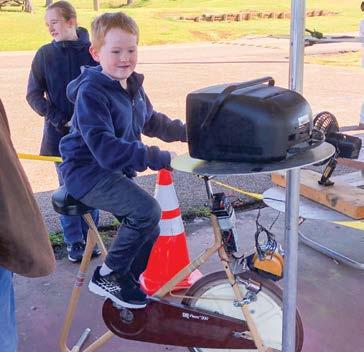


Here’s your opportunity to try some of our favorite tasty desserts featuring this tiny morsel of chocolatey goodness! Yum!
Curtis (PEPA Retiree) and Seretha Gregory
INGREDIENTS
1 box milk chocolate cake mix
3 boxes chocolate pudding
1 tub cool whip
1 cup chocolate chips
Chocolate syrup as desired
Bake cake according to directions. Mix pudding according to directions. Break cake apart.
Distribute into punch bowl. Add a layer of pudding. Next a layer of cool whip. Top with chocolate chips. Repeat layers. Top with chocolate syrup if desired.
Michal Pennington, PEPA General Accountant
INGREDIENTS
1 box light brown sugar
1 teaspoon baking powder
1 teaspoon vanilla
3 eggs
1 six-ounce package semi-sweet chocolate chips
2 ½ cups self-rising flour
1 cup oil
Mix together light brown sugar, flour, and baking powder until most of the lumps are gone. Add eggs, vanilla, and oil, and mix together. Then stir in semi-sweet chocolate chips. Pour into 9" x 13" pan and cook at 350 degrees for 30 minutes.




Jennifer Johnson, PEPA HR Manager
INGREDIENTS
30-40 saltine crackers
1 cup light brown sugar
2 sticks of butter
8 ounces semi-sweet chocolate chips
or until completely cold. They will form one
Preheat oven to 425 degrees. Line 1 large or 2 small jelly-roll pans with aluminum foil, spray with non-stick cooking spray, and arrange saltines salt-side down in a single layer. In a medium saucepan, melt butter and brown sugar together, and boil until it turns a caramel color, a few minutes. Remove from heat and pour over crackers, covering them evenly. Put the jelly-roll pan in the oven and bake for 3-5 minutes, or until just bubbly, watching carefully. Remove from the oven and pour chocolate chips over crackers. When the chips melt a bit, spread them over the crackers with a knife. Transfer pan to freezer for 15-20 minutes, or until completely cold. They will form one big sheet. Break up into pieces. Store in an airtight container.



We honor those who courageously gave their lives in military service for the United States.
MONDAY, MAY 27





Pontotoc Electric Power Association will be closed Monday, May 27, 2024, in observance of Memorial Day. To report power outages or emergencies, please call 662-489-6711 (Pontotoc) or 662-983-2727 (Bruce). A Pontotoc Electric dispatcher is on duty 24 hours a day, seven days a week.



For more information, call 601-947-4211 or 228-497-1313.
www.singingriver.com

In the next two weeks, you will receive a notice for Singing River Electric’s Annual Membership Meeting. Online voting and proxy returns for our board of directors election will begin on Monday, May 13. I encourage you to participate in early voting options by voting online or returning your proxy. Voting establishes our cooperative’s local leadership. Singing River Electric is required to reach a quorum, between attendance and early voting participation, to conduct business at the annual meeting.
Simply complete, tear o , and return the mailed proxy, or vote online using your SmartHub app or by visiting singingriver.com. Members who vote online or return proxies will be eligible to win one of six $250 prizes or one grand prize of $500.
Members will vote for director candidates in each of three geographic districts. These Singing River Electric members live in our

local communities, have been nominated by the membership, and are certified as qualified candidates by the Credentials and Election Committee, also made up of Singing River Electric members. Candidate biographies are available on Singing River Electric’s election website. Visit singingriver.com and click on the “Vote Here” button at the top of the page to view director election information and to vote. See page 16 in this issue of Today in Mississippi for more information on the voting process.
Electric co-ops are led by members just like you who understand our local communities. We encourage you to attend our 2024 Annual Membership Meeting on Thursday, June 27, at Singing River Electric’s Lucedale o ce. If you are unable to attend, please take advantage of early voting by voting online or returning your proxy. As a Singing River Electric member, your vote matters. We appreciate your e orts as we continue to provide safe, reliable, and a ordable electric service for our members.
by Brian Hughey General Manager and CEO






When the time comes to replace your HVAC (Heating, Ventilation, Air Conditioning) system, I recommend replacing your unit with an electric heat pump. The most important thing to understand about heat pumps is the SEER Rating (Seasonal Energy E ciency Ratio.) Think of SEER as miles per gallon for an automobile – the higher the SEER, the more e cient the equipment will run. The Department of Energy e ciency standards for our southern region require a minimum 14 SEER; a 14 SEER or greater is required to qualify for our Comfort Advantage energy-e cient home rebate program.
When purchasing a new heat pump, ask these questions:
• What size do I need? Properly sizing a unit for your home is important.
• What e ciency rating should I look for? This is the SEER rating.
• Which type of HVAC system is best for my home? A heat pump or mini split are two options.
• Is my existing duct work adequate for a new heat pump? Making sure your duct work is su cient to support your newer HVAC is vital.
• What is the life expectancy of the new HVAC system? On average, the lifespan of today’s HVAC systems is 15-20 years.
• Which thermostat will work best for my new HVAC system? Programmable thermostats can aid in lowering monthly energy use.
To see if you qualify for an energy-e ciency rebate for your new heat pump, visit our Comfort Advantage page at www.singingriver.com.
Gabe Robbins Energy Services Representative robbins@singingriver.com11187 Old 63 South, Lucedale Registration opens at 5 p.m. Meeting begins at 6 p.m.
Singing River Electric’s 2024 Annual Membership Meeting is scheduled for Thursday, June 27. The meeting will be held at our headquarters o ce located at 11187 Old 63 South in Lucedale. Registration will open at 5 p.m., and the meeting will begin at 6 p.m. The meeting’s business section will include the cooperative’s financial, management, and board reports, as well as the board of directors election. SRE has a 10-person board of directors elected from the membership in three geographic districts. Each year, one director post from each district is up for election. Every three years, District 3 has two director posts open. Directors are elected for a three-year period.
Participating in the election
To conduct business at the annual meeting, a quorum of at least 10% of the membership is necessary. The quorum is derived by adding the number of members present at the meeting, the number of valid online votes, and the number of valid proxies received.
Annual meeting notices and proxies will be mailed on Monday, May 13, to all members. The deadline for voting online and returning proxies is Tuesday, June 18, at the close of business. Your participation in the director election is important because it counts toward the quorum needed to hold and conduct business at the meeting.
Any member may vote in person at the June 27 membership meeting. Members can also vote online or by proxy. Each member is entitled to one vote regardless of the number of accounts in the member’s name. A proxy may be assigned to the board as a whole. A member can vote up to 200 assigned proxies at the membership meeting. The presence of a member at the meeting or an online vote, or in the case of joint membership the presence of a spouse, shall revoke the proxy.
Members who vote online or return their proxy will qualify to win up to $500 cash. Those attending the annual meeting will be eligible for attendance prizes.





THERE ARE THREE WAYS TO PARTICIPATE: IN PERSON, BY PROXY, & ONLINE
Six members who vote online or return their proxies by the June 18 deadline will be selected to receive a $250 CASH prize.
One member who votes online or returns the proxy by the deadline will receive a special grand prize of $500 CASH!
Nominations for election to the board of directors are made by petition. Interested members must acquire signatures of 25 SRE members on a form provided by the cooperative. Applicants must complete and return a director candidate packet to the Lucedale o ce and be certified by the Credentials and Election Committee before being placed on the ballot. The deadline for nomination by petition to be placed on the 2024 Annual Meeting Notice was February 29, 2024. This deadline and a notice for nominations was placed in the January and February 2024 issues of the Today in Mississippi magazine.
This year’s slate of nominees was approved by SRE members serving on the Credentials and Election Committee. According to the cooperative bylaws, the candidates’ names will be placed in the nomination for election to a three-year term beginning June 27, 2024, at the annual meeting.
DISTRICT 1 POST 3 – To represent Greene, Perry and Wayne counties, and Washington County in Alabama. Cary E. Williams
DISTRICT 2 POST 3 – To represent George and Stone counties, and Mobile County in Alabama. Travis Baxter Rickey E. Breland Sherwin Ray
DISTRICT 3 POST 3 – To represent Jackson and Harrison counties.
Edward H. Thornton
DISTRICT 3 POST 4 – To represent Jackson and Harrison counties.
Jared M. Case
Mark W. LaSalle
On May 13, annual meeting notices will mail and online voting will begin. WE
Singing River Connect o cially announced its partnership with Jackson County to provide free Wi-Fi service at Lum Cumbest Park in Hurley. At East Central Civic Association’s Old Fashion Day event on March 23, SR Connect representatives visited with attendees to promote the park’s SmartTown Community Wi-Fi along with the speed and local customer service SR Connect provides to its fiber internet subscribers.
SmartTown o ers community-wide Wi-Fi coverage made possible by a high-speed fiber connection and is secure, safe, and simple to use. Signs bearing QR codes are strategically placed throughout Lum Cumbest Park, allowing visitors to download Passpoint and access SR Connect SmartTown Wi-Fi for free. Visitors can roam freely and stay connected while attending sporting events and other activities at the park.
“The Lum Cumbest Park SmartTown Wi-Fi project extends the Concern for Community cooperative principle to the fiber internet side of our business and lets all park visitors experience what true high-speed fiber internet is,” said Singing River Electric/Connect Manager of Business Operations Nick DeAngelo. “We entered the fiber internet business on behalf of Singing River Electric members and our local communities so they could have the best internet service available.”
“We are proud to partner with Singing River Electric in providing this service to our citizens,” said Jackson County District 1 Supervisor Barry Cumbest. “We feel this is another opportunity to enhance the experience our visitors will have at Lum Cumbest Park.”

































Children in the Sand Hill community now have access to free books at any time thanks to the Little Free Library Program initiated by teacher Ashley Roberts. The program aligns with the school’s educational values, as it o ers accessible and free reading materials to people of all ages.
“Our nearest public library is a 20-minute drive, so the convenience of free books in our community is a great advantage,” said Roberts.
A $1,277.56 Neighbors Helping Neighbors Community Grant from Singing River Electric purchased two Little Free Libraries which are housed on the Sand Hill Attendance Center campus. There’s also a counter for each library to keep track of how many times the libraries are used.
“For the last three years, we’ve successfully run a Book of the Month program. The Little Free Library Program will allow us to not only promote literacy but also community involvement,” explains Roberts.
For more information on Singing River Electric’s Neighbors Helping Neighbors Community Grant program, visit www.singingriver.com/my-community. The next application deadline is Friday, May 10, 2024.

Electrical safety starts with being aware of electrical hazards. Think safety first and use these tips to stay safe at home, on the job and on the go.
Electrical safety starts with being aware of electrical hazards. Think safety first and use these tips to stay safe at home, on the job and on the go.
Electrical safety starts with being aware of electrical hazards. Think safety first and use these tips to stay safe at home, on the job and on the go.



Making payments and accessing your account through Singing River Electric’s automated phone system is even more secure. Members now need a personal identification number (PIN) to gain access to their account by phone. To set your PIN, follow the prompts while using the IVR system or call our o ce to speak to a member service representative. Thanks to the added security of the PIN, we can now accept checks by phone and set up recurring payments with a checking account. Note: a PIN is not required to report a power outage.


Electricity from power lines can “jump” to nearby objects…including you. That’s why you should always stay at least 10 feet away from overhead lines.
Electricity from power lines can “jump” to nearby objects…including you.
Electricity from power lines can “jump” to nearby objects…including you. That’s why you should always stay at least 10 feet away from overhead lines.
Electricity from power lines can “jump” to nearby objects…including you. That’s why you should always stay at least 10 feet from overhead lines.
That’s why you should always stay at least 10 feet away from overhead lines.
Attention DIYers:
Attention DIYers:
Attention DIYers:
There are live wires behind those walls.
Use an electrical cable detector to locate them before your drill bit does.
Before you dig that flowerbed, remember there may be underground lines where you’re about to dig. Call 811 to locate them and your project will turn out just rosey. To
There are live wires behind those walls. Use an electrical cable detector to locate them before your drill bit does.
There are live wires behind those walls. Use an electrical cable detector to locate them before your drill bit does.
Attention DIYers: There are live wires behind those walls. Use an electrical cable detector to locate them before your drill bit does.
Want more electrical safety tips? Sure you do.
Want more electrical safety tips? Sure you do. Just visit BeAwareEverywhere.com
Just visit BeAwareEverywhere.com
Before you dig that flowerbed, remember there may be underground lines where you’re about to dig. Call 811 to locate them and your project will turn out just rosey.
Before you dig that flowerbed, remember there may be underground lines where you’re about to dig. Call 811 to locate them and your project will turn out just rosey.
Before you dig that flowerbed, remember there may be underground lines where you’re about to dig. Call 811 to locate them and your project will turn out just rosey.







I’m sure you’ve heard the old saying, “Business as usual.” Southern Pine’s work of providing safe, reliable, and a ordable electricity remains business as usual; however, the obstacles we face to provide that service can be very unusual at times.
We experience typical weather events such as thunderstorms that can cause outages — business as usual. Then, sometimes the unusual occurs and we experience a hurricane or tornado that can cause significant damage to our service territory. Whether it is a typical storm or a rare weather event, we must be ready to do whatever is necessary to continue delivering reliable service. As your electric cooperative, we don’t have the option of doing anything less.
Each and every year we purchase materials and equipment, enlist the services of contractors and various vendors to take care of your electrical distribution system — business as usual. In recent times, we have been experiencing unusual supply chain issues coupled with inflation. This has been a challenge; however, with the combined e orts of our employees and vendors we have been able to collaborate with alternative suppliers and find the necessary materials to continue to provide the service our members expect.
We are now faced with another unusual circumstance. The intense heat wave and drought experienced during 2023 has impacted our entire state. According to the Mississippi Forestry Commission, our state has over 12,500,000 dead trees. The monumental task of clearing them is a challenge that Southern Pine, our entire industry, and the


state, will face for years to come. This one event is estimated to cost the timber industry, and landowners, millions of dollars and will only get worse if we face another drought this year. Every dead tree along Southern Pine’s right-of-way is a potential outage. Identifying and removing every dead tree along Southern Pine’s right-of-way is both extremely costly and time consuming. However, plans are being developed to manage to the best of our abilities.
The state, and all of Mississippi’s electric cooperatives impacted by the drought face the same issue. Solving it will require time, a huge investment of financial and personnel resources, and the collaboration between state agencies and our state and federal government. As a cooperative, joining together for the common good of members, and for the state, is what we do best, and that is what we will continue to do.
We are completely focused on our goal of providing safe, reliable, and a ordable electricity. With joint e orts, hard work, and smart decisions we will be able to overcome and move on from this latest unusual circumstance and continue with business as usual.
 by Chris K. Rhodes
President/CEO Southern Pine Electric
by Chris K. Rhodes
President/CEO Southern Pine Electric





Southern Pine held a Member Circle event in Forrest County at Mack’s on the River on March 15. The event gave members an opportunity to hear directly from Southern Pine leaders and employees and ask questions about topics of interest to them.
CEO Chris Rhodes welcomed everyone and introduced Mike Kennedy, Taylorsville district manager, to the guests. Mike discussed updates from the district and answered questions from members. Director of Engineering Richie Matson spoke about engineering work that’s been done to combat blinks and outages for a member who he’s been working with that is at the end of the line.
As everyone enjoyed the meal, Candace Keen, large power billing specialist, talked with members about understanding their bills and went over the parts of a bill. Rhodes, and the Southern Pine sta , answered questions for the remainder of the evening. Members left happy that their questions and concerns were addressed.
Member Circle events are held in all counties in the Southern Pine territory on a rotating basis.










Growing up in Mount Olive, Mississippi, Judy Toney always appreciated the tiny treasures she found in nature and God’s creations. Her parents, Theron and Rachel Chain, instilled this appreciation and love for nature in her from an early age.
Judy still lives near the home where she grew up, and many years later, she still fi nds that same joy and wants to share it with others. In 2016, she received a Nikon camera from her husband, Greg, as an anniversary gift, and she fell in love with photography.
“I discovered it was a good way to relax, unwind, and pray. When I’m in nature taking pictures, I talk to God,” Judy said. “Taking pictures of God’s creations is something I love to do.”
Judy said that many people miss out on the small beauties of the world because of busy schedules. She tries to highlight these beauties and share them on her Facebook page for anyone to see.
Judy and Greg have been married for 46 years. They have two sons, four grandchildren, and four great-grandchildren. Judy retired from the Covington County School District after over 28 years of service. She is actively involved in the Covington County Litter Prevention Committee. She wants to keep her home county clean and litter-free so everyone can appreciate the beauty that she sees.





















Communications email: voice@southernpine.coop
1. Raise your thermostat. The smaller the difference between the indoor and outdoor temp, the more you’ll save.
2. Install window coverings like blinds or light-blocking curtains to prevent indoor heat gain during the day.
When summer temperatures rise, so do our energy bills. Here are a few ways you can reduce energy use and grow your summer savings. Source:
3. Seal leaks with caulk and weatherstripping around windows and exterior doors. Air leaks force your air conditioner to work harder and run longer than necessary.
4. Run ceiling fans for additional cooling but turn them off when you leave the room.
5. Lower your water heater thermostat to 120 degrees to reduce standby heat loss.






























SUNDAY, MAY 12




Our o ce will be closed Monday, May 27, in observance of Memorial Day.

Dispatchers will remain on duty and crews will be on call throughout the holiday.
Use the SmartHub app or call 800-287-8564 or text OUT to 844-975-2728 to report an outage.





I often hear claims you’ll never pay an electric bill again if you go solar. Is that true?
The ability to generate your own renewable energy at home is an amazing thing. However, there are truths and steps members need to know before utilizing this resource. The concept of free energy from the sun is appealing, but solar power isn’t free. There are costs associated with capturing that energy for use in your home.
Installing a residential solar system doesn’t equate to $0 energy bills. Prices for the solar system and installation vary, but adding solar typically comes with a five-figure price tag. Solar systems only provide power when the sun is shining. You still rely on your electric utility for power at night and when the skies are cloudy. Most electric utility rate structures include a set monthly service fee. Unless you plan to disconnect from local electric service completely, you will still have a monthly electric bill.
If you are considering solar on your home, I suggest taking these three steps:
1
Make sure your home is as energy e cient as possible. It wouldn’t make sense to put a new motor on a boat with holes in it, so why would you put a solar system on an energywasting home? Invest in reducing wasted energy before investing in creating new energy. The e ciency updates I recommend before installing solar include insulating and air sealing your home and upgrading to e cient appliances — especially the heating, ventilation, and air conditioning system.
If your HVAC system is older than 10 years or malfunctioning, make sure replacing it is in the budget. Remember, energy e ciency upgrades might have a better return on investment than installing solar.
A more e cient home means a smaller — and lower-cost — solar energy system. Solar systems are typically designed to produce the amount of energy a home uses in a year, so if you complete energy e ciency improvements before installing a solar system, make sure the solar contractor accounts for those energy savings.
2
Check with your electric utility about the requirements to install solar and how it will impact your bill. If you decide to install solar panels, working with your utility will be essential, as you will need to take important steps, such as signing an interconnection agreement to ensure the system is properly connected to the electric grid.

3
Get at least three quotes to compare each contractor’s recommended system design, equipment and cost. It’s a significant investment, so you want to know your options.
There are several ways to pay for a solar system and installation. It can be bought outright with cash or financed by a loan. This allows you to own the system immediately or at the end of the loan term.
There is also the option to install a solar system through a lease or power purchase agreement. In this structure, a third party — usually the solar installer — owns the system. They install the system on your property and then sell you the energy produced at a predetermined rate. They are responsible for maintaining the system and own it at the end of the agreement term.
Loans, leases and power purchase agreements can impact the sale of a home. Although a solar system may increase the value of your home, some buyers — or their lenders — are not interested in taking on leases or power purchase agreements.
Miranda Boutelle is the chief operating o cer at E ciency Services Group in Oregon.

Riley Carson Construction Crew Leader


Riley Carson joined the Southwest Electric family in May 2013 after graduating from Mississippi Delta Community College’s Lineman Program. He finished the Lineman Apprenticeship Program sponsored by the Electric Cooperatives of Mississippi in January 2021. Riley was promoted to Crew Leader in August 2022. As a Crew Leader, he ensures the linemen on his crew work safely while installing new service for Members and upgrading and maintaining our distribution system. He and his wife, Caitlin, live in Natchez and have one daughter.

On page 10 of this edition of Today in Mississippi, you will find an article about the drought and beetles causing extensive damage to trees in all 82 counties of Mississippi, with most of them in the southwest and central areas. Southwest Electric spends over $3 million each year on right-of-way trimming and maintenance. In 2024, we will spend an extra $1 million cutting down dead trees to prevent as many outages as possible. Contractors are identifying these dangerous trees and cutting them down. They are concentrating on the trees that pose the most danger to the three-phase lines coming out of our substations because, if these lines are damaged it takes longer to restore power.
Benito Foster Dispatcher
Benito started working at Southwest Electric in October 2013. He is one of four dispatchers that monitor our distribution system 24/7 every day of the year. Dispatchers receive outage notifications from Members through our Outage Management System, send out crews to restore power, respond to underground line locate requests through the 811 system and manage emergencies such as house fires and vehicle accidents involving poles. Benito lives in Port Gibson.
Pole inspections in the area indicated on the map will begin shortly. EXO will inspect close to 8,000 poles in southwest Je erson County and northeast Adams County. If you live in this area, you may see EXO personnel digging around and treating our poles. The inspections will take six weeks to complete. Inspecting and replacing poles is a vital part of our e ort to maintain reliable electric service to our Members. Utility poles are out in the elements and need to be inspected to ensure they are strong enough to remain on our distribution system. In the event a pole does not pass inspection, crews will return to the area and replace that pole.
The drought and beetle infestation have resulted in the U.S. Department of Agriculture declaring natural disaster areas. This is a wide-spread problem and we will not be able to cut down every danger tree along all of our power lines. In fact, trees that pose a danger to a Member’s dwelling, shop or other structure will not be cut.
We are noting all phone calls from our Members about danger trees, but we may not be able to address every tree that is reported. We appreciate your patience as we respond to this unprecedented and serious situation.





















Trees are majestic, beautiful, and good for the soul. But we also know that our members depend on us to deliver reliable power to their homes and businesses. That’s why Twin County strives to balance maintaining the beautiful surroundings we all cherish with ensuring reliable electricity. You might not realize it, but there are several benefits to regular tree trimming.
Working near power lines can be dangerous, and we care about your safety and that of our lineworkers. For example, if trees are touching power lines in our members’ yards, they can pose a grave danger to families. If children can reach those trees, they can potentially climb into a danger zone. Electricity can arc, or jump, from a power line to a nearby conductor such as a tree.
Any tree or branch that falls across a power line creates a potentially dangerous situation. A proactive approach lessens the chances of fallen trees during severe weather events that make it more complicated and dangerous for lineworkers to restore power.
As a co-op, Twin County always strives to keep costs down for our members. If trees and other vegetation are left unchecked, they can become overgrown and expensive to correct. A strategic vegetation management program helps keep costs down for everyone.
When it comes to vegetation management, there are ways you can help too. When planting new trees, make sure they’re planted a safe distance from overhead power lines. Medium-height trees (40 ft. or smaller) should be planted at least 25 ft. from power lines. Taller trees (over 40 ft.) should be planted at least 50 ft. from power lines. You can also practice safe planting near pad-mounted





transformers. Plant shrubs at least 10 ft. from the transformer door and 4 ft. from the sides. If your neighborhood has underground lines, remember to contact 811 before you begin any project that requires digging.
Additionally, if you spot an overgrown tree or branch that’s dangerously close to overhead lines, please let us know by contacting us.
We have deep roots in our community, and we love our beautiful surroundings. It takes a balanced approach, and our vegetation management program is a crucial tool in ensuring service reliability.
Keeping power lines clear of overgrown vegetation improves service reliability. After all, we’ve seen the whims of Mother Nature during severe weather events with fallen tree limbs taking down power lines and utility poles. While many factors can impact power disruptions, about half of all outages can be attributed to overgrown vegetation. This is why you sometimes see Twin County crews or contractors out in the community trimming trees near power lines. Our trimming crews have been trained and certified based on the latest industry standards.
In fact, all U.S. electric utilities are required to trim trees that grow too close to power lines. Scheduled trimming throughout the year keeps lines clear from overgrown or dead limbs that are likely to fall, and we are better able to prepare for severe weather events.
Plus, we all know it’s more cost-e ective to undertake preventative maintenance than it is to make repairs after the fact. Drone inspections of power lines and vegetation allow us to reduce labor and equipment costs while bolstering reliability. Through the use of small drones, we can accurately monitor the health and growth of trees and identify potential problems.









 by Miranda Boutelle
by Miranda Boutelle
QWhat are some energysaving tasks I can add to my spring cleaning list?
ASpring is a great time to refresh, clean, and enhance energy e ciency at home.
By adopting simple yet e ective energy-saving strategies during our spring-cleaning routines, we can create an e cient living environment that may also lower our utility bills and extend the life of our heavily used appliances.
Be sure to include these spring cleaning tips to add some energy savings to the job.
Even though it’s out of sight, don’t leave it out of mind. Check the filter in your HVAC system. Your furnace worked hard during the winter. Ensuring your system has a clean filter is a low-cost and easy way to protect your equipment and maximize e ciency. A dirty furnace filter can cause your system to work harder than necessary, decreasing e ciency and shortening the system’s life.
While the filter is easy to replace yourself, you should have your air conditioning serviced and professionally cleaned. Both the indoor and outdoor units should be cleaned. Dirty refrigerant coils reduce e ciency. This also applies to heat pumps and ductless heat pumps, also known as mini-split systems. The technician can check refrigerant levels and refill or repair if necessary.
HVAC contractors get busy responding to calls for repairs during the summer heat. Scheduling cleaning services for your air conditioning in the spring — before the heat of the summer — can ensure the work gets done before the rush and even save you money. Some HVAC contractors o er special discounts for cleaning services in the milder months, which helps fill their schedules and keep their technicians working.




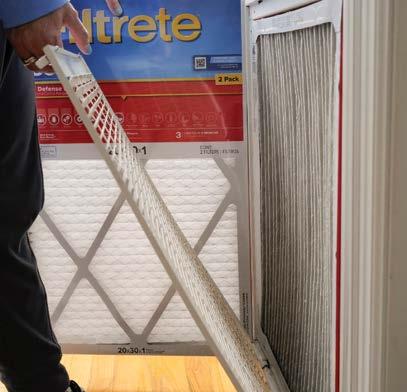

Window AC units can get dirty, too. They can be cleaned with the proper tools, cleaning agents and know-how. Always unplug before cleaning, and wait until completely dry to plug it back in again. Take the time to clean it properly in the spring before you need it in the summer.
Cleaning light fixtures and fixture covers can brighten your space by removing dust and grime collected during the winter. While you are at it, be sure to check your bulbs and replace any incandescent or compact fluorescent with energy-saving LEDs. Although they tend to cost a little more, LEDs last longer and use less energy. Good-quality LED light bulbs are expected to last 30,000 to 50,000 hours, according to the Department of Energy. A typical incandescent lamp lasts about 1,000 hours, and a comparable CFL lasts 8,000 to 10,000 hours. To put this into everyday use, if you have an LED light on for 10 hours per day, it can last 13 years compared to only about three months for incandescent bulbs and about two-and-a-half years for CFLs.

Don’t forget the oven. A clean oven heats more evenly and quickly, providing better results and lower energy use. A clean oven window allows you to see the food and how it’s cooking without opening the oven door, which wastes energy.
If cleaning windows is on the list, check the seals and sash locks to ensure they close tightly. Check for any areas that need caulking or sealing to reduce drafts. Sealing around windows contributes to year-round comfort in your home. Clean windows also allow more light into the home, reducing the need to turn on lamps and overhead fixtures.
Spring is the ideal time to declutter, deep clean, and implement practices that not only tidy our homes, but also reduce energy consumption, contributing positively to our homes’ energy e ciency and saving money on energy use.






2022 gures, in cents per kWh







Source: U.S. Energy Information Administration Numbers rounded to nearest tenth of a cent

















Yazoo Valley Electric Power Association recently retired capital credits. That means many members will either receive a check or a bill credit.
Active accounts with capital credit retirements of less than $150 will see their return in the form of a bill credit. This helps keep rates low while saving members time and money.
Many members have questions about capital credits and how they work. Below are five important things to know about capital credits.
Yazoo Valley is a member-owned electric cooperative owned by the individuals and businesses receiving electric service from YVEPA.
Electric cooperatives are not-for-profit companies that abide by the seven cooperative principles. One of these principles is members’ economic participation, which means members contribute equitably to and democratically control the capital of the cooperative.
Each member earns capital credits from the margin created when revenues exceed the total operating costs and expenses for the year. This margin is allocated to each member’s capital credit account based on the member’s patronage for that year. Capital credit retirements are a return of those allocations to the members.
Annually, the board reviews the cooperative’s financial strength and can declare a capital credit retirement that results in a check or credit to an account to each eligible active member or inactive member.

Yazoo Valley utilizes a hybrid retirement method that allows a portion of the retirement to be paid to the members with capital credit balances in the most recently completed year and a portion to the members with capital credit balances in the oldest year or years still having balances.
This hybrid method allows 2023 members to participate in the retirement, as well as members from 2001 and 2002. Operating capital credits retired in 2024 amount to $1,445,801.16.
Also, Cooperative Energy, the cooperative’s power provider, retired capital credits in the amount of $296,000 in 2023. This amount will be retired to the Yazoo Valley members and is included in the 2024 capital credit retirement. This provides for a total capital credit retirement of $1,741,801.16.
Yazoo Valley’s Board of Directors annually reviews the cooperative’s financial position and can declare a capital credit retirement.
Inactive members remain eligible for capital credit retirements after leaving the cooperative if they have a capital credit account balance. YVEPA will need to have a current address on file.
Yazoo Valley utilizes the non-retired capital credits in the ongoing operations of the cooperative. Capital credits are a significant source of equity for the cooperative. Equity is used to help finance assets of the cooperative, such as investments in poles, wire, transformers, and substations.
Capital credits help keep rates at an a ordable level by reducing the amount of funds that must be borrowed to grow and maintain Yazoo Valley’s electric system.

For instance, for 2024 a portion of 2023 capital credits will be retired along with the remainder of 2001 and a portion of 2002.



Since beginning capital credit retirements in 1993, Yazoo Valley has retired more than $33.5 million in capital credits. Yazoo Valley has made consistent annual retirements over the 32-year period, fully retiring operating margins for 1955-2001.

























 by Jason Patteron
by Jason Patteron
Wil Saxton learned about hard work watching his parents Brian and ReShawn.
“They were my biggest influence because they pushed me to be the best version of myself every day,” Saxton said. “It didn’t matter how I felt or if I wanted to do it, my parents pushed me daily.”
The example that they set has served him well because it took a tremendous amount of hard work to get Saxton where he is today.
Many high school football players dream of playing college football one day, but that dream is out of reach for most. Under eight percent of high school football players make the roster of a college team. Only 1-in-40 get signed by a Division I program.
Coming from a small school like Benton Academy makes getting noticed an even bigger challenge, but Saxton was determined to earn a chance to live his dream. During his senior season at BA, he helped lead his team to an 8-3 record and earned a spot on the 3A All-MAIS team as an o ensive lineman. In addition to his outstanding performance on the field every Friday night, Saxton started making a name for himself at football camps.



“That’s what it takes to be a college football player,” Saxton said. “You have to put in the work – even when you don’t feel like it.”
All that work paid o when Saxton signed a scholarship to play for The University of Southern Mississippi. The 6-3, 325-pound lineman is now preparing for his second season.
“Playing at Southern Miss has been nothing short of amazing,” Saxton said. “The friendships that I have made and relationships I have built with my teammates will be something I cherish forever.”



 Wil Saxton with his parents Brian and ReShawn Saxton at The University of Southern Mississippi.
Tatum Reeves, son of Yazoo Valley's Josh Reeves, works with Holman Edwards.
Wil Saxton and Johnathon Demita work with a young athlete during last year’s football camp.
Wil Saxton with his parents Brian and ReShawn Saxton at The University of Southern Mississippi.
Tatum Reeves, son of Yazoo Valley's Josh Reeves, works with Holman Edwards.
Wil Saxton and Johnathon Demita work with a young athlete during last year’s football camp.
You have to put in the work –even when you don’t feel like it.
Despite his heavy workload as a student athlete Saxton has made the time to give back to his hometown.
Last year he hosted a successful youth football camp on the same field where he played in high school. He brought some of his teammates with him to o er quality instruction to young players. Yazoo Valley’s Johnathon Demita, who was a talented high school football player, also assisted. Several children of Yazoo Valley employees were among those participating in the camp.
“The kids seem to have fun, and they were ready to work so it all went smoothly,” Saxton said.
This year Saxton will host a second camp at Manchester Academy in Yazoo City on May 25. There will be three age groups, first to third grade ($45 registration), fourth to sixth grade ($50 registration), and seventh to 12th grade ($60 registration).
“Players can expect to be pushed to the max,” Saxton said. “We are going to teach them drills that they can take with them and do on their own. We will be full of energy, and we will help every kid who participates take a step forward in football.”
Saxton said he draws from his own experience when asked by young players what it takes to compete on the college level.
“You have to give everything you have every single time you step on the field,” he said. “Be disciplined, and do whatever it takes to beat the man across from you no matter the circumstances.”




Text 662-590-5222 to register for the camp. Walk ups will be accepted, but you must register by May 10 to get a shirt.



 James Patterson, son of Yazoo Valley’s Jason Patterson, works on his passing during the 2023 Wil Saxton Football Camp.
James Patterson, son of Yazoo Valley’s Jason Patterson, works on his passing during the 2023 Wil Saxton Football Camp.
Yazoo Valley’s Right-of-Way crew has been working hard to tackle the risks to our system posed by the epidemic of dead pines throughout our system. Drought conditions and pine beetles have caused a major issue with dead pines statewide. Many of the dead trees are in danger of falling on power lines, and our crews are working daily to try to remove as many as possible. Yazoo County’s Road Department recently assisted us with work on Eden Midway Road.
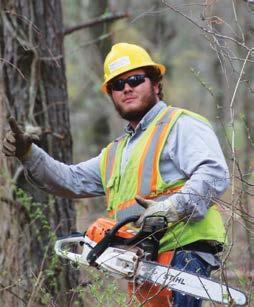




 Joseph Brooks holds a dead tree steady while Cary Lipsey makes a cut. Cary Lipsey cuts a dead tree along a roadway in Holmes County.
Jose Solano uses a bucket to get high enough to tie a rope in a tall dead pine o of Eden Midway Road.
Boone Brazil and Jose Solano help make sure a dead pine falls safely while Kapin Engleman cuts it down.
Ashton Kelly and Cary Lipsey prepare to tie a rope to a large dead pine tree to help make sure it falls in a safe direction.
Joseph Brooks holds a dead tree steady while Cary Lipsey makes a cut. Cary Lipsey cuts a dead tree along a roadway in Holmes County.
Jose Solano uses a bucket to get high enough to tie a rope in a tall dead pine o of Eden Midway Road.
Boone Brazil and Jose Solano help make sure a dead pine falls safely while Kapin Engleman cuts it down.
Ashton Kelly and Cary Lipsey prepare to tie a rope to a large dead pine tree to help make sure it falls in a safe direction.
Last month, I, members of our government relations team, board members, and some of our Mississippi cooperative general managers traveled to Washington, D.C. to attend the National Rural Electric Cooperative Association 2024 Legislative Conference.
Here, electric cooperatives and their statewide organizations from around the country gather to discuss and plan the most important priorities for our members, so we have a unified message for our lawmakers and federal partners in the nation’s capital.
The biggest priority, as I’ve said before in this column, is reliability. It’s crucial that U.S. energy policy meet the fundamental expectation of our members – families and businesses expect the lights to stay on at a cost they can a ord. The expectation is not a partisan issue, and the stakes are too high to get it wrong.
One of our priorities that underpins our foundational principle of reliability is to get lawmakers to oppose the Environmental Protection Agency’s power plant rule on greenhouse gases. The rule mandates unproven technology and unachievable emissions limits on an unworkable timeframe in violation of the law and Supreme Court decisions. The rule could force the closure of power plants while making it harder to build new plants. Congress must oppose this rule.
Second, Congress needs to reject any proposals for new pole attachment regulations and compliance timelines under the guise of streamlining broadband deployment. We cannot have one-size-fits-all rates for attachments and timelines to review and respond to pole attachment requests from other companies. Those rules and timelines do not accurately






account for the unique cost of constructing and maintaining a distribution pole network in hard-to-reach, high cost, and low-density areas. Our members should not be forced to subsidize billion-dollar companies.
Third, Congress must oppose cuts to a United States Department of Agriculture financial assistance program for electric cooperatives to purchase or build new clean energy systems. The program — ERA — is currently funded at $9.7 billion and may include grants, loans, debt modifications, and refinancing. That program allows for flexibility for electric co-ops to design projects that meet community needs without jeopardizing a ordability or reliability.
These are just a few of the legislative issues your electric cooperatives are working to get lawmakers to champion in the quest for continued energy reliability and a ordability.
As the year moves forward, watch this space for occasional updates on how we’re doing.
Feel free to call or write your Congress members to let them know that this agenda is your agenda.
Reliable electricity is vital to America’s and Mississippi’s economies.
 by Michael Callahan
by Michael Callahan



 Executive Vice President/CEO Electric Cooperatives of Mississippi
Executive Vice President/CEO Electric Cooperatives of Mississippi







Mississippi is the place where I grew up, they called me the Mississippi mud pup. The times here are laid back and easy, you don’t have to get in a hurry, just be lazy. The people here are as friendly as can be, and all that walks her lands are free.
Mississippi is just a small piece of land in the United States, but to be raised here or just visit is great. Mississippi is full of things to do, hunting, fishing, and swimming too. You can go for a walk in her beautiful forest, or just go to a nearby farm and ride a horse. You can sail on her waters of all kinds, or just lay in a green meadow and free your mind. There is no place more beautiful to me than this land called Mississippi.



Michael Brown died in August 2021. The poem was submitted by his niece, Kim Brown Hood.
What’s Mississippi to you?
What do you treasure most about life in our state? Send your brief thoughts to Today in Mississippi, news@ecm.coop or mail to P.O. Box 3300, Ridgeland, MS 39158
Submit your beautiful digital photo of life in Mississippi to Today in Mississippi, news@ecm.coop







